2022年人教版中考英语二轮复习话题四 计划与安排、日常及节假日活动、购物课件(共161张PPT)
文档属性
| 名称 | 2022年人教版中考英语二轮复习话题四 计划与安排、日常及节假日活动、购物课件(共161张PPT) | 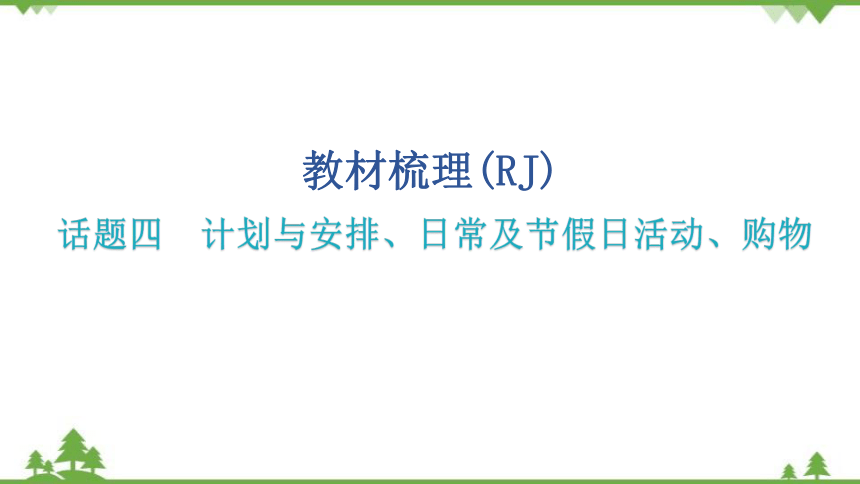 | |
| 格式 | pptx | ||
| 文件大小 | 905.6KB | ||
| 资源类型 | 教案 | ||
| 版本资源 | 人教新目标(Go for it)版 | ||
| 科目 | 英语 | ||
| 更新时间 | 2022-05-28 10:01:33 | ||
图片预览

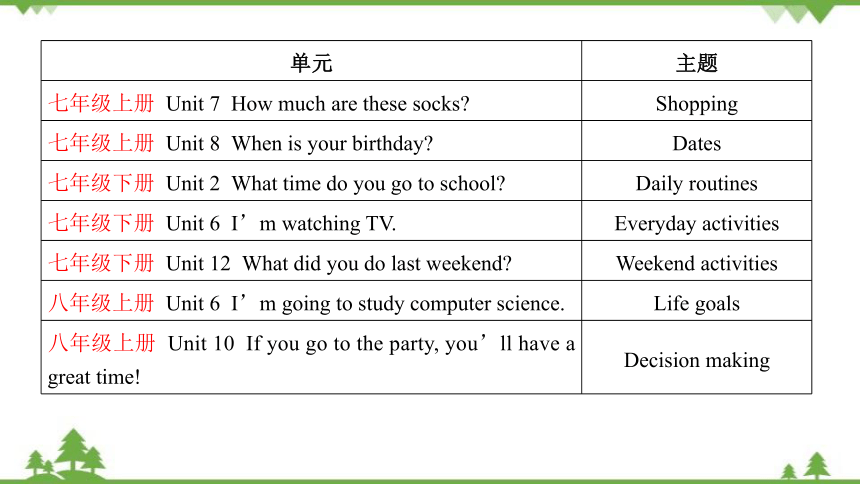
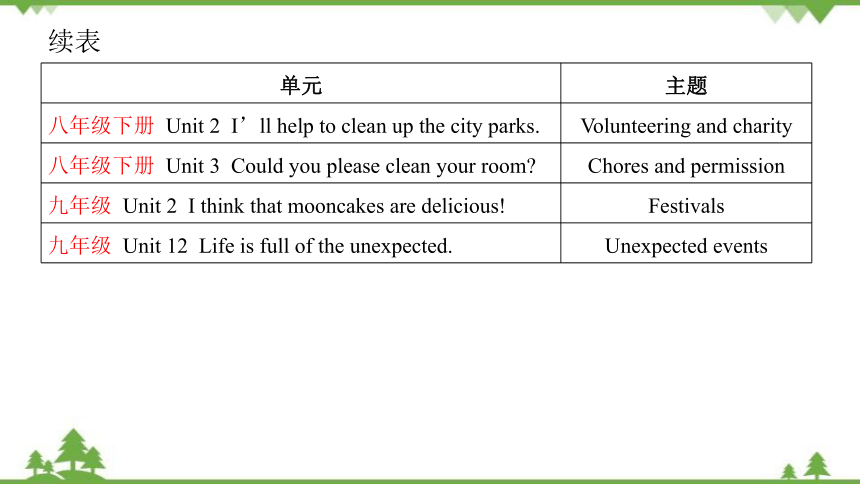
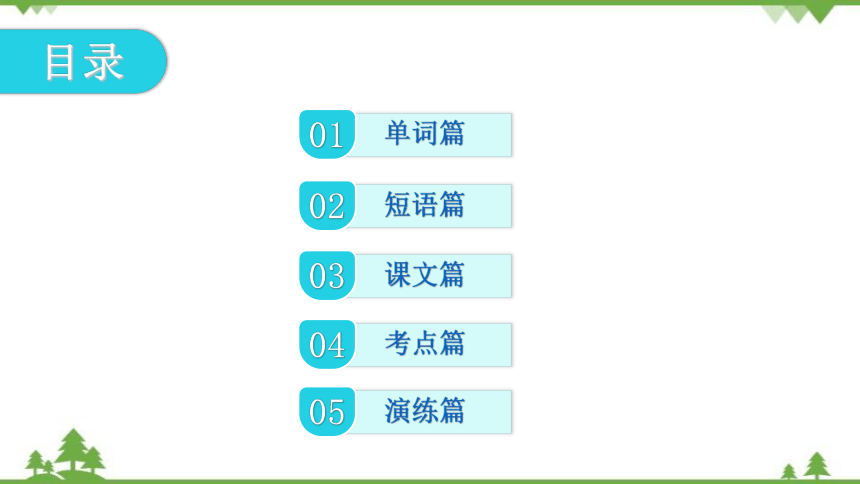
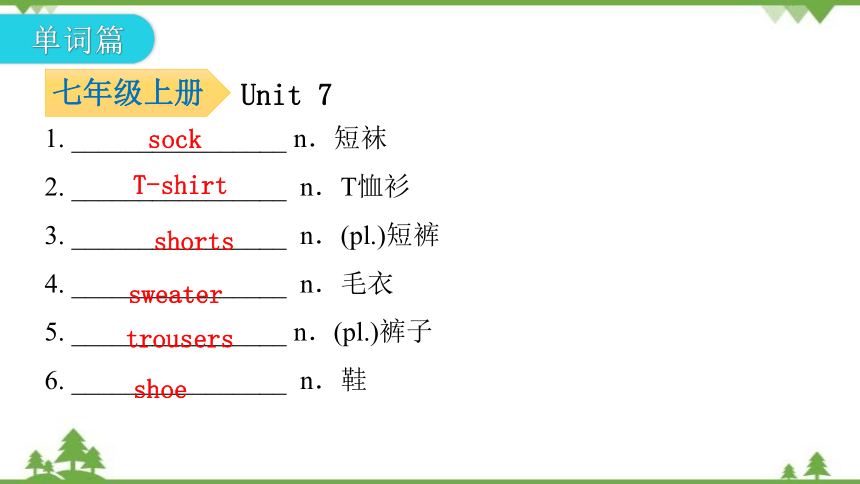
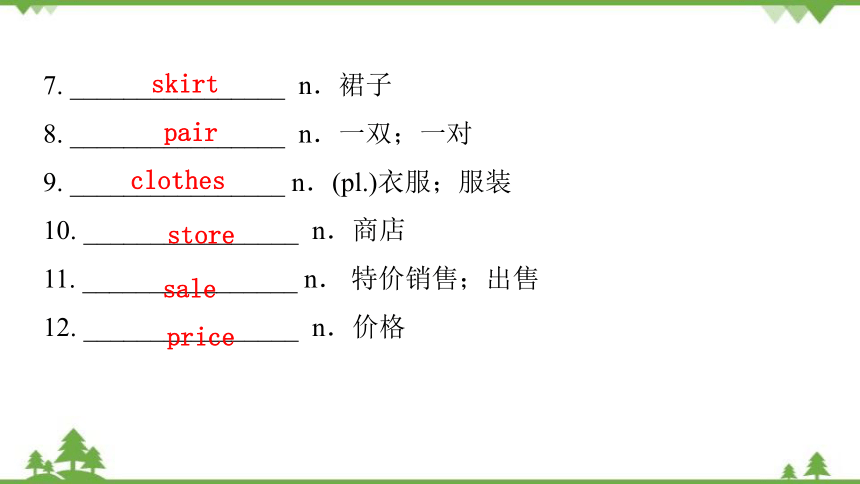
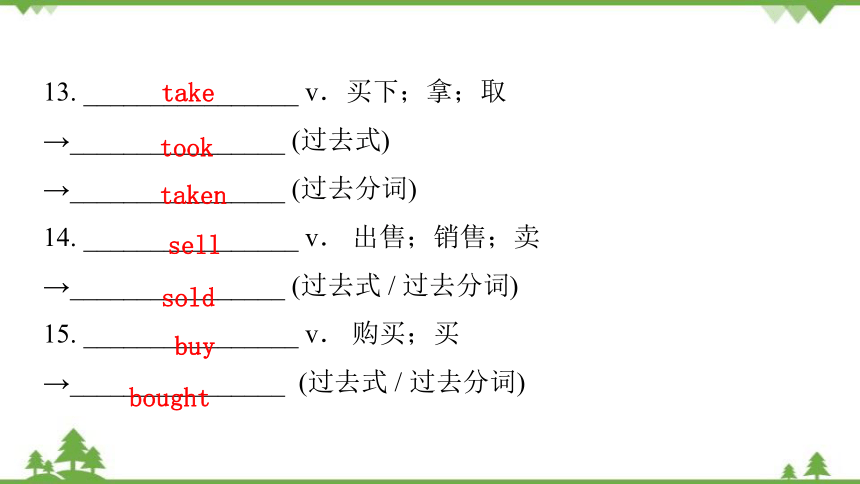
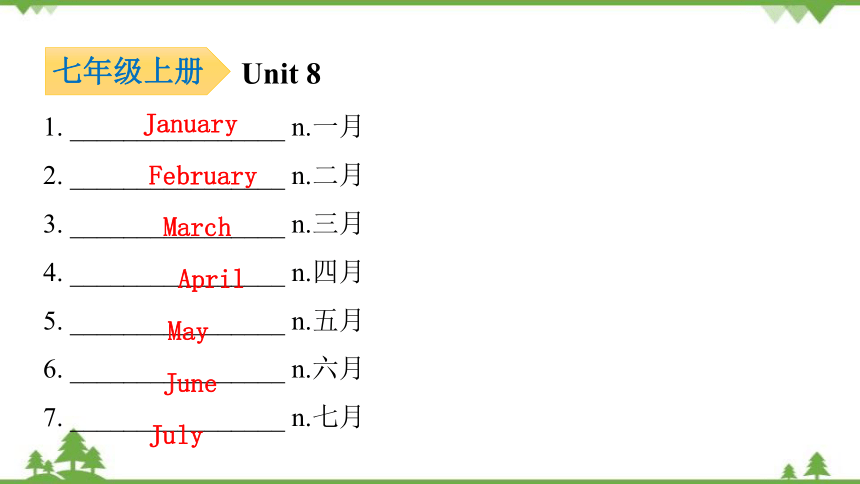
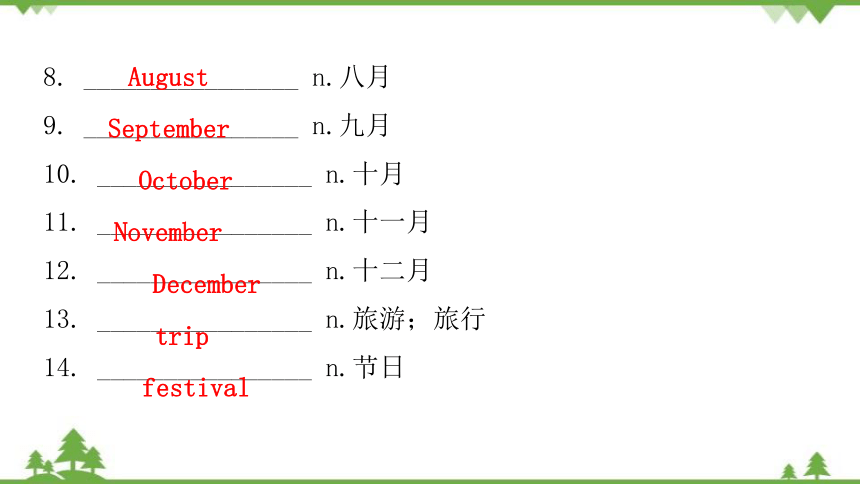
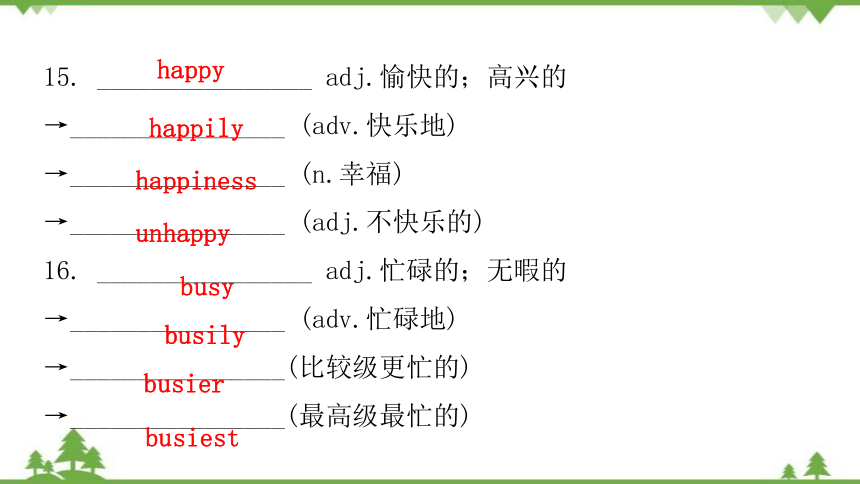
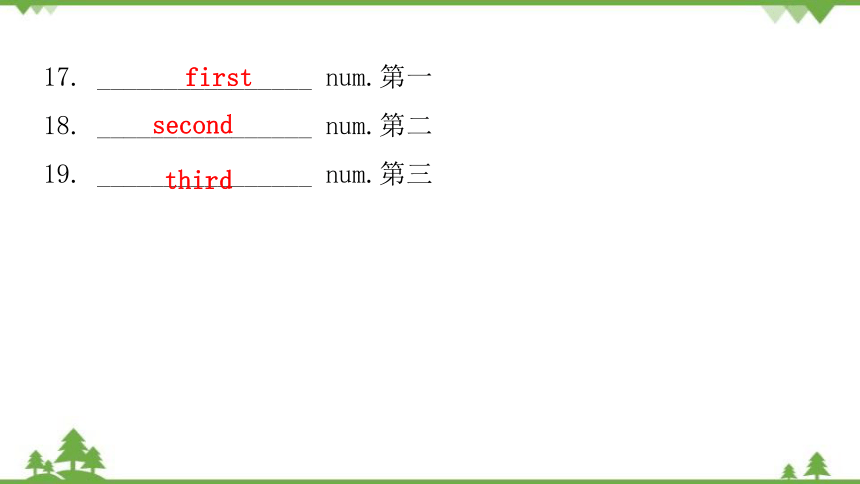
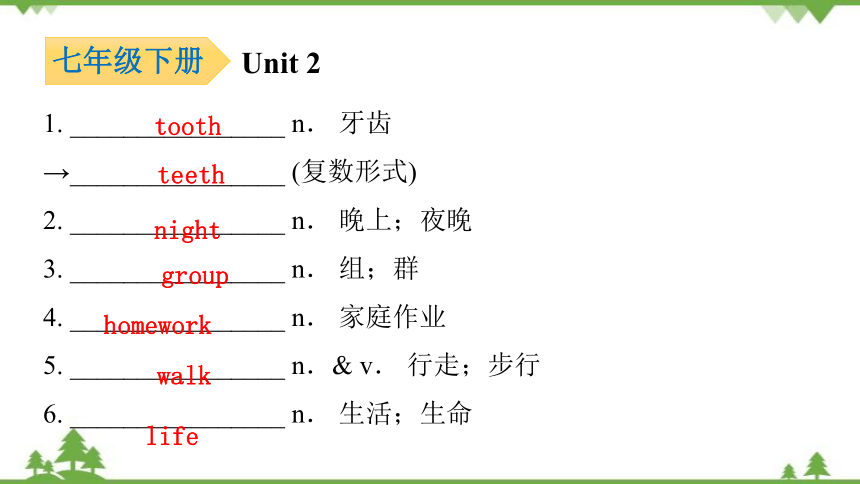
文档简介
(共161张PPT)
教材梳理(RJ)
话题四 计划与安排、日常及节假日活动、购物
单元 主题
七年级上册 Unit 7 How much are these socks Shopping
七年级上册 Unit 8 When is your birthday Dates
七年级下册 Unit 2 What time do you go to school Daily routines
七年级下册 Unit 6 I’m watching TV. Everyday activities
七年级下册 Unit 12 What did you do last weekend Weekend activities
八年级上册 Unit 6 I’m going to study computer science. Life goals
八年级上册 Unit 10 If you go to the party, you’ll have a great time! Decision making
单元 主题
八年级下册 Unit 2 I’ll help to clean up the city parks. Volunteering and charity
八年级下册 Unit 3 Could you please clean your room Chores and permission
九年级 Unit 2 I think that mooncakes are delicious! Festivals
九年级 Unit 12 Life is full of the unexpected. Unexpected events
续表
目录
01
单词篇
02
短语篇
03
课文篇
04
考点篇
05
演练篇
单词篇
七年级上册
Unit 7
1. ________________ n.短袜
2. ________________ n.T恤衫
3. ________________ n.(pl.)短裤
4. ________________ n.毛衣
5. ________________ n.(pl.)裤子
6. ________________ n.鞋
sock
T-shirt
shorts
sweater
trousers
shoe
7. ________________ n.裙子
8. ________________ n.一双;一对
9. ________________ n.(pl.)衣服;服装
10. ________________ n.商店
11. ________________ n. 特价销售;出售
12. ________________ n.价格
skirt
pair
clothes
store
sale
price
13. ________________ v.买下;拿;取
→________________ (过去式)
→________________ (过去分词)
14. ________________ v. 出售;销售;卖
→________________ (过去式 / 过去分词)
15. ________________ v. 购买;买
→________________ (过去式 / 过去分词)
take
took
taken
sell
sold
buy
bought
1. ________________ n.一月
2. ________________ n.二月
3. ________________ n.三月
4. ________________ n.四月
5. ________________ n.五月
6. ________________ n.六月
7. ________________ n.七月
七年级上册
Unit 8
January
February
March
April
May
June
July
8. ________________ n.八月
9. ________________ n.九月
10. ________________ n.十月
11. ________________ n.十一月
12. ________________ n.十二月
13. ________________ n.旅游;旅行
14. ________________ n.节日
August
September
October
November
December
trip
festival
15. ________________ adj.愉快的;高兴的
→________________ (adv.快乐地)
→________________ (n.幸福)
→________________ (adj.不快乐的)
16. ________________ adj.忙碌的;无暇的
→________________ (adv.忙碌地)
→________________(比较级更忙的)
→________________(最高级最忙的)
happy
happily
happiness
unhappy
busy
busily
busier
busiest
17. ________________ num.第一
18. ________________ num.第二
19. ________________ num.第三
first
second
third
1. ________________ n. 牙齿
→________________ (复数形式)
2. ________________ n. 晚上;夜晚
3. ________________ n. 组;群
4. ________________ n. 家庭作业
5. ________________ n.& v. 行走;步行
6. ________________ n. 生活;生命
七年级下册
Unit 2
tooth
teeth
night
group
homework
walk
life
7. ________________ v. 穿衣服n.连衣裙
8. ________________ v.& n. 工作
→________________ (n. 工人)
9. ________________ v.& n. 锻炼;练习
10. ________________ v. 跑;奔
→________________ (过去式)
→________________ (过去分词)
dress
work
worker
exercise
run
ran
run
11. ________________ v. 打扫; 弄干净adj. 干净的
→________________ (n.清洁工人)
12. ________________ v. 有……的味道;品尝n.味道
13. ________________ adj. 奇怪的;滑稽好笑的
14. ________________ pron. 大量;许多
15. ________________ conj. 或者adv.也
clean
cleaner
taste
funny
lot
either
1. ________________ n. 报纸
2. ________________ n. 汤
3. ________________ n. 茶;茶叶
4. ________________ n. 游泳池;水池
5. ________________ n. 超市
6. ________________ n. 竞赛
七年级下册
Unit 6
newspaper
soup
tea
pool
supermarket
race
7. ________________ n. 儿童
→________________ (复数形式)
8. ________________ v. 使用;运用
→________________ (adj. 有用的)
→________________ (adj.无用的)
9. ________________ v. 洗
child
children
use
useful
useless
wash
10. ________________ v. 喝n. 饮料
→________________ (过去式)
→________________ (过去分词)
11. ________________ v. 购物n. 商店
12. ________________ v.& n. 学习;研究
13. ________________ v. 怀念;思念;错过
14. ________________ v. 希望
drink
drank
drunk
shop
study
miss
wish
15. ________________ adj. 美国的n.美国人
→________________ (n. 美国)
16. ________________ adj. 幼小的;年轻的
17. ________________ adj. 可口的;美味的
18. ________________ adv. 在明天n.明天;未来
American
America
young
delicious
tomorrow
1. ________________ n. 湖;湖泊
2. ________________ n. 海滩;沙滩
3. ________________ n. 游客;访问者
→________________ (v. 参观)
4. ________________ n. 老鼠; 耗子
→________________ (复数形式)
七年级下册
Unit 12
lake
beach
visitor
visit
mouse
mice
5. ________________ n. 风筝
6. ________________ n. 印度
→________________ (adj. 印度的n.印度人)
7. ________________ n. 森林
8. ________________ v. 扎营;搭帐篷
9. ________________ v. 停留;待
kite
India
Indian
forest
camp
stay
10. ________________ v. 呼叫;喊叫
11. ________________ v. 飞
→________________ (过去式)
→________________ (过去分词)
12. ________________ v. 移动
13. ________________ v. 开始;着手
shout
fly
flew
flown
move
start
14. ________________ v. 跳;跃
15. ________________ v. 弄醒; 醒
→________________ (过去式)
→________________ (过去分词)
16. ________________ adj. 自然的
→________________ (adv. 自然)
→________________ (n. 自然界)
jump
wake
woke
waken
natural
naturally
nature
1. ________________ n. 厨师v.烹饪;煮
2. ________________ n. 医生
3. ________________ n. 工程师
4. ________________ n. 小提琴手
→________________ (n. 小提琴)
5. ________________ n. 驾驶员;司机
→________________ (v. 驾驶)
八年级上册
Unit 6
cook
doctor
engineer
violinist
violin
driver
drive
6. ________________ n. 飞行员
7. ________________ n. 钢琴家
→________________ (n. 钢琴)
8. ________________ n. 科学家
→________________ (n. 科学)
9. ________________ n. 学院;大学;高等专科学校
10. ________________ n. (综合性)大学;高等学府
11. ________________ n. 伦敦
pilot
pianist
piano
scientist
science
college
university
London
12. ________________ n. 承诺;诺言v. 许诺
13. ________________ n. 关系;联系
14. ________________ v. 邮寄;发送
→________________ (过去式 / 过去分词)
15. ________________ v. 改善;改进
→________________ (n. 改善)
promise
relationship
send
sent
improve
improvement
16. ________________ v. 用颜料画;在……上刷油漆
→________________ (n. 绘画)
→________________ (n. 画家)
17. ________________ adj. 外国的
→________________ (n. 外国人)
paint
painting
painter
foreign
foreigner
18. ________________ adj. 能够
→________________ (adj. 不能……的)
→________________ (n. 能力)
→________________ (v. 使残废)
19. ________________ adj. 身体的
20. ________________ adj. 个人的,私人的
able
unable
ability
disable
physical
personal
1. ________________ n. 会议;集会;会面
2. ________________ n. 出租汽车;的士
3. ________________ n. 劝告;建议
4. ________________ n. 钱包
5. ________________ n. 经验;经历
6. ________________ v. 组织;筹备
→________________ (n. 组织)
八年级上册
Unit 10
meeting
taxi
advice
wallet
experience
organize
organization
7. ________________ v.& n. 旅行;游历
8. ________________ adj. 难过;失望;沮丧
9. ________________ adj. 正常的;一般的
→________________ (adv. 通常)
10. ________________ adj. 发怒的;生气的
→________________ (adv. 发怒地)
→________________ (n. 怒气)
11. ________________ adj. 善解人意的
travel
upset
normal
normally
angry
angrily
anger
understanding
1. ________________ n. 满足;满意
2. ________________ n. 高兴;愉快
3. ________________ n. (尤指长途)旅行;行程
4. ________________ n. 车轮;轮子
5. ________________ n. 训练;培训
→________________ (v.训练)
八年级下册
Unit 2
satisfaction
joy
journey
wheel
training
train
6. ________________ n. 仁慈;善良
7. ________________ n. 兴趣;关注v. 使感兴趣
8. ________________ v. 欢呼;喝彩
→________________ (adj. 高兴的)
9. ________________ v. 义务做n. 志愿者
10. ________________ v. 想象;设想
→________________ (n. 想象力)
kindness
interest
cheer
cheerful
volunteer
imagine
imagination
11. ________________ v. 理解;领会
→________________ (过去式 / 过去分词)
12. ________________ v.& n. 变化;改变
13. ________________ adj. 孤独的;寂寞的
14. ________________ adj. 强烈的;强壮的
→________________ (n. 力量)
understand
understood
change
lonely
strong
strength
15. ________________ adj. 破损的;残缺的
16. ________________ adj. 丧失能力的;有残疾的
17. ________________ adj. 瞎的;失明的
18. ________________ adj. 聋的
19. ________________ adj. 激动的;兴奋的
broken
disabled
blind
deaf
excited
1. ________________ n. 垃圾;废弃物
2. ________________ n. 地板
3. ________________ n. 杂乱;不整洁
4. ________________ n. 浪费;垃圾v.浪费;滥用
5. ________________ n. 公正性;合理性
→________________ (adj. 合理的)
→________________ (adj. 不公正的)
八年级下册
Unit 3
rubbish
floor
mess
waste
fairness
fair
unfair
6. ________________ n. 邻居
7. ________________ v. 折叠;对折
→________________ (v. 展开)
8. ________________ v. 扫;打扫
→________________ (过去式 / 过去分词)
9. ________________ v. 扔;掷
→________________ (过去式)
→________________ (过去分词)
neighbor
fold
unfold
sweep
swept
throw
threw
thrown
10. ________________ v. 提供;供应
11. ________________ v. 依靠;信赖
→________________ (n.依赖)
→________________ (adj. 依靠的)
→________________ (adj. 独立的)
→________________ (n. 独立)
provide
depend
dependence
dependent
independent
independence
12. ________________ v. 发展;壮大
→________________ (n. 发展)
→________________ (adj. 发展中的)
→________________ (adj.发达的)
develop
development
developing
developed
1. ________________ n. 陌生人
2. ________________ n. 亲属;亲戚
3. ________________ n. 磅(重量单位)
4. ________________ n. (饭后)甜点;甜食
5. ________________ n. 款待;招待v.招待
6. ________________ n. 圣诞节
九年级
Unit 2
stranger
relative
pound
dessert
treat
Christmas
7. ________________ n. 现在;礼物adj. 现在的
8. ________________ n. 温暖;温和
→________________ (adj. 温暖的)
9. ________________ v. 偷;窃取
→________________ (过去式)
→________________ (过去分词)
10. ________________ v. 放置;安放;产(卵);下(蛋)
→________________ (过去式 / 过去分词)
present
warmth
warm
steal
stole
stolen
lay
laid
11. ________________ v. 存在;平躺;处于
→________________ (过去式)
→________________ (过去分词)
→________________ (现在分词)
12. ________________ v. 处罚;惩罚
→__________________(n. 处罚)
13. ________________ v. 传播;展开 n. 蔓延;传播
→__________________(过去式 / 过去分词)
lie
lay
lain
lying
punish
punishment
spread
spread
1. ________________ n. 背包;旅行包
2. ________________ n. 机场
3. ________________ n. 奶油;乳脂
4. ________________ n. 豆;豆荚
5. ________________ n. 市场;集市
6. ________________ n. 蠢人;傻瓜v. 愚弄
→________________ (adj. 愚蠢的)
九年级
Unit 12
backpack
airport
cream
bean
market
fool
foolish
7. ________________ v. 睡过头;睡得太久
→________________ (过去式 / 过去分词)
8. ________________ v. 着火;燃烧
→________________(过去式)
→________________(过去分词)
9. ________________ v. 取消;终止
10. ________________ adj. 出乎意料的
oversleep
overslept
burn
burnt / burned
burnt / burned
cancel
unexpected
11. ________________ adj. 活着;有生气的
12. ________________ adj. 可相信的;可信任的
→________________ (v. 相信)
13. ________________ adv. 向西adj. 向西的n.西
14. ________________ prep. 在……上面adv.在上面
15. ________________ prep.& conj. 到;直到
alive
believable
believe
west
above
till
短语篇
七年级上册
Unit 7
1.需要……去做 ______________________
2.一双 ______________________
3.在我们大促销时 ______________________
need … for …
a pair of
at our great sale
七年级上册
Unit 8
1.英语测验 ________________________
2.学校开放日 ________________________
3.英语 / 体育节 ________________________
4.艺术节 ________________________
5.本学期 ________________________
6.下个月 ________________________
7.生日派对 ________________________
English test
School Day
English / Sports Day
art festival
this term
next month
birthday party
七年级下册
Unit 2
1.穿上衣服 __________________________
2.刷牙 __________________________
3.洗淋浴 __________________________
4.广播电台 __________________________
5.做作业 __________________________
get dressed
brush (one’s) teeth
take a shower
radio station
do (one’s) homework
6.散步;走一走 ________________
7.大量;许多 ________________
8.半小时 ________________
9.要么…… 要么…… ________________
take a walk
lots of
half an hour
either … or …
七年级下册
Unit 6
1.看报纸 ____________________________
2.去电影院 ____________________________
3.出去吃饭 ____________________________
4.喝茶 ____________________________
5.做汤 ____________________________
6.端午节 ____________________________
7.与某人一起做某事 ____________________________
read a newspaper
go to the movies
eat out
drink tea
make soup
Dragon Boat Festival
join sb. for sth.
七年级下册
Unit 12
1.去划船 ________________
2.去海滩 ________________
3.深夜不睡;熬夜 ________________
4.跑开 ________________
5.搭起;举起 ________________
6.互相;彼此 ________________
go boating
go to the beach
stay up late
run away
put up
each other
7.如此……以至于…… ________________
8.第二天早上 _______________________
9.向……外看 _____________________
10.上上下下;起伏 ________________
so … that …
the next morning
look out of …
up and down
1.在……开始 _________________________
2.由于这个原因 ______________________
3.不同种类的 _________________________
4.身体健康 _____________________
5.长大;成熟;成长 ________________
6.确信; 对……有把握 ________________
八年级上册
Unit 6
at the beginning of
for this reason
different kinds of
physical health
grow up
be sure about
7.确保;查明 ________________
8.成为足球队的一员 ________________________
9.向某人许下诺言 _________________________
10.改善我们的生活 ___________________
11.写下;记录下 ________________
12.关于; 与……有关系 _____________________
make sure
make the soccer team
make promise to sb.
improve our lives
write down
have to do with
13.(尤指为消遣)学着做;开始做 ________________
14.制订周计划 ___________________________
15.继续做某事 ___________________________
16.能够做某事 ___________________________
take up
make a weekly plan
keep on doing sth.
be able to do sth.
八年级上册
Unit 10
1.玩得开心 ____________________________
2.待在家里 ____________________________
3.给某人一些建议 ____________________________
4.周游世界 ____________________________
5.从……得到建议 ____________________________
6.保守秘密 ____________________________
have a great time
stay at home
give sb. some advice
travel around the world
get advice from …
keep … to oneself
7.在……方面有问题 __________________________
8.犯错 __________________________
9.躲开;回避 __________________________
10.炸土豆片;炸薯条 __________________________
11.最后 __________________________
12.分成两半 __________________________
13.让某人做某事 __________________________
have problems with …
make mistakes
run away from
potato chips
in the end
in half
ask sb. to do sth.
14.尽力做某事 _____________________________
15.不敢做某事 _____________________________
16.完成或做了事情的一部分 ___________________________
try to do sth.
be afraid to do sth.
be halfway to doing sth.
八年级下册
Unit 2
1.打扫(或清除)干净 ________________
2.分发;散发 ________________
3.推迟 ________________
4.打电话给(某人);征召 ________________
5.照顾;非常喜欢 ________________
6.参加……选拔;试用 ________________
clean up
give out
put off
call up
care for
try out
7.赠送;捐赠 ___________________________
8.建起;设立 ___________________________
9.(外貌或行为)像 ___________________________
10.想出;提出 ___________________________
11.改变某人的生活 ___________________________
12.影响;有作用 _________________________________
13.过去常常做某事 ___________________________
give away
set up
take after
come up with
change one’s life
make a difference (to …)
used to do sth.
1.倒垃圾 _____________________________
2.扫地 _____________________________
3.做家务 _____________________________
4.依靠;信赖 _____________________________
5.照顾;处理 _____________________________
6.给某人提供某物 _____________________
八年级下册
Unit 3
take out the rubbish
sweep the floor
do chores
depend on
take care of
provide sth. for sb.
7.学会独立 ___________________________
8.频繁;反复 ___________________________
9.吃惊地;惊讶地 ___________________________
10.浪费时间 ___________________________
11.一……就…… ___________________________
12.目的是;为了 ___________________________
13.培养某人的独立性 ___________________________
learn to be independent
all the time
in surprise
a waste of time
as soon as
in order to
develop one’s independence
九年级
Unit 2
1.泼水节 _____________________________
2.元宵节 _____________________________
3.增加(体重);发胖 ________________
4.与……相似 _____________________________
5.拒绝做某事 _____________________________
6.与某人分享某物 _____________________________
(the) Water Festival
(the) Lantern Festival
put on
be similar to
refuse to do sth.
share sth. with sb.
7.捉弄某人 _____________________
8.承诺做某事 ___________________
9.需要(帮助)的人 ___________________
10.不但……而且…… ___________________________
play a trick on sb.
promise to sb.
people in need
not only … but also …
九年级
Unit 12
1.在……以前 ___________________________
2.(闹钟)发出响声 ___________________________
3.捎……一程 ___________________________
4.充满…… ___________________________
5.即使;尽管 ___________________________
6.与……成一排 ___________________________
by the time …
go off
give … a lift
be full of …
even though
in line with
7.盯着看;凝视 ___________________________
8.心中想;盘算 ___________________________
9.变成 ___________________________
10.赶到;露面 ___________________________
11.在(某时间点)以前 ___________________________
12.化装舞会 ___________________________
stare at
think to oneself
turn into
show up
by the end of
costume party
13.愚人节 ___________________________
14.卖光 ___________________________
15.减肥 ___________________________
16.成千上万的;数以千计的 ___________________________
17.转向;回转 ___________________________
18.正要做某事 ___________________________
April Fool’s Day
sell out
lose weight
thousands of
turn around
be about to do sth.
七年级上册
Unit 7
1.那件棕色的毛衣多少钱
________________________________________________
2.我们在大甩卖,快来买衣服吧!
________________________________________________
3.我需要为上学买一件毛衣。
________________________________________________
课文篇
How much is that brown sweater
Come and buy your clothes at our great sale!
I need a sweater for school.
七年级上册
Unit 8
1.你的生日在什么时候
________________________________________________
2.他的生日在一月十七号。
________________________________________________
3.我们在学校图书馆进行一次售书活动。
________________________________________________
When is your birthday
His birthday is on January 17th.
We have a book sale in the school library.
4.本学期我们为大家安排了一些有趣又好玩的事情。
_____________________________________________________
We have some interesting and fun things for you this term.
七年级下册
Unit 2
1.我没多少时间吃早餐。
_________________________________________________
2.晚上我要么看电视要么玩电脑游戏。
_____________________________________________________
I don’t have much time for breakfast.
In the evening, I either watch TV or play computer games.
3.——你通常什么时候洗淋浴
_____________________________________________
——我通常6点40分洗淋浴。
_____________________________________________
4.她知道这对她(健康)不利,但它(指冰激凌)却很好吃!
She knows ________________ her, but it ________________ good!
—What time do you usually take a shower
—I usually take a shower at six forty.
it’s not good for
tastes
七年级下册
Unit 6
1.你想跟我一起吃个饭吗?
________________________________________________
2.他爸爸和叔叔正在看电视上的龙舟比赛。
________________________________________________
Do you want to join me for dinner
His dad and uncle are watching the boat races on TV.
七年级下册
Unit 12
1.多么有趣啊!
_____________________________________________
2.重要的是不要靠近蛇。
_____________________________________________
How interesting!
It was important not to go near a snake.
3.——你(们)上周末做什么了
__________________________________________________
——我做家庭作业了。/ 我们去划船了。
__________________________________________________
4.当我们从帐篷里向外看时,我们看见一条大蛇正在篝火旁睡觉。
When we ___________ our tent, we _____________________ near the fire.
—What did you do last weekend
—I did my homework. / We went boating.
looked out of
saw a big snake sleeping
八年级上册
Unit 6
1.许多决定与自我提高有关。
____________________________________________________
2.有时这些决定可能会太难而无法实现。
____________________________________________________
Many resolutions have to do with self-improvement.
Sometimes the resolutions may be too difficult to keep.
3.——你打算什么时候开始呢
____________________________________________________
——我打算上完高中和大学后开始。
____________________________________________________
4.当在一年的开始做决定时,我们希望会改善我们的生活。
When we make resolutions ________________ the year, we hope that we are going to ________________.
—When are you going to start
—I’m going to start when I finish high school and college.
at the beginning of
improve our lives
八年级上册
Unit 10
1.如果你那样做的话,老师们将不会让你进去。
_______________________________________________
2.最好不要逃避我们的问题。
_______________________________________________
3.在英语中,我们说与人分担一个烦恼就像把烦恼分成两半。
In English, we say that ________________ is like ______________.
If you do, the teachers won’t let you in.
It is best not to run away from our problems.
sharing a problem
cutting it in half
八年级下册
Unit 2
1.我们需要想出一个计划来告诉人们关于打扫城市公园的事。
We need to ________________ a plan to ________________ the city park clean-up.
2.你可以请求医院让你去拜访这些孩子并使他们高兴起来。
You could ______________ let you visit the kids and ____________.
come up with
tell people about
ask hospitals to
cheer them up
3.有了你的帮助,我才有可能拥有“幸运儿”(狗名)。
You helped to __________________________ have Lucky.
make it possible for me to
1.——请你打扫一下你的房间,好吗
______________________________________
——好的,当然可以。
______________________________________
八年级下册
Unit 3
—Could you please clean your room
—Yes, sure.
2.我认为对孩子们来说学会如何做家务和帮助父母做家务是重要的。
I think _____________________ children ______ learn how to do chores and _______________________________.
it is important for
to
help their parents with housework
3.孩子们越早学会独立,对他们的未来就越好。
________________ kids learn to be ________________, ________________ it is for their future.
The earlier
independent
the better
九年级
Unit 2
1.我想知道他们明年是否还会举行比赛。
___________________________________________________
2.多么有趣的泼水节啊!
___________________________________________________
3.他只关心他是否能赚到更多的钱,他厌恶圣诞节。
He just ____________________ he can ________________ and he hates Christmas.
I wonder if they’ll have the races again next year.
What fun the Water Festival is!
cares about whether
make more money
九年级
Unit 12
1.当我到家的时候,我意识到我把钥匙忘在背包里了。
________________, I realized I ________________ my keys in the backpack.
2.在我走进教室之前,老师已经开始讲课了。
________________ I walked into class, the teacher ________________ teaching ________________.
When I got home
had left
By the time
had started
already
考点1
How much引导的特殊疑问句【七年级上册 Unit 7】
专练 在横线上填入恰当的单词(含缩略形式)补全对话
1.—How much ________________ those pens
—________________ 20 yuan.
2.—How much ________________ the salad
—________________ 10 dollars.
考点篇
are
They’re
is
It’s
3.—How much ________________ Jim’s shoes
—________________ 60 dollars.
4.—How much ________________ this tape player
—________________ 150 yuan.
点拨
1.—How much is … + 单数名词 / 不可数名词 —It’s …
2.—How much are … + 复数名词 —They’re …
are
They’re
is
It’s
考点2
序数词【七年级上册 Unit 8】
( )1.It’s my _________ time to come to the bookstore this month because most of the books in it are my favorite.
A.forth B.four C.fourth D.fours
( )2.Boys and girls, please turn to Page _________ and look at the _________ picture.
A.Fifth; five B.Five; five C.Fifth; fifth D.Five; fifth
C
D
( )3.Linda has _________ classes this morning, and the _________ class is English.
A.four; four B.fourth; four C.fourth; fourth D.four; fourth
( )4.He climbed so fast that he reached _________ floor in two minutes.
A.nine B.the nine C.the ninth D.ninth
D
C
点拨 序数词是数词的一种,在汉语中意为“第几”。(详解见主书第一部分[第三节 数词])
考点3
时间介词in,on,at的用法【七年级上册 Unit 8】
专练
( )1.—Is your birthday party _________ eight this morning
—No, it’s _________ September 12th.
A.at, in B.on, in C.at, on D.in, in
( )2.My grandparents’ birthdays are _________ July.
A.at B.in C.on D./
C
B
( )3.Students don’t go to school_________ Sundays.
A.in B.at C.on D.to
点拨 in后面接年份、月份、季节、朝代、世纪;on后面接某月某日、节日、有修饰语的朝夕、星期;at后面接钟点。
C
考点4
What time和When引导的特殊疑问句【七年级下册 Unit 2】
专练 根据句意,用what time 或when填空
1.—_________________________ do you get up every day
—At 6:40.
2.—______________ is your birthday party, Rick
—It’s next Saturday.
What time / When
When
点拨
what time和when 的区别 对做某事的具体时间点进行询问时,when和what time均可用
对钟表显示的具体时间进行询问时,即询问几点几分时,只能用what time
对非具体时间点进行询问时,只能用when
考点5
钟点时刻的表达【七年级下册 Unit 2】
专练 翻译时刻
1.6:20 twenty ________________
2.5:35 twenty-five ________________
3.7:30 ________________ seven
past six
to six
half past
点拨
钟点时刻的表达 1.当时间是整点时,可用“钟点数+o’clock”来表达,其中o’clock可以省略
2.当时间不是整点时 (1) 钟点数+分钟数
(2) 分钟数+ past / to +钟点数 ①当分钟数小于或等于30时,用“分钟数+ past +钟点数”表示“几点过几分”
②当分钟数大于30时,用“(60-分钟数)+ to +下一个钟点数”表示“差几分到几点”
【注意】一刻钟(15分钟)用a quarter,半小时(30分钟)用half
考点6
either … or … 的用法【七年级下册 Unit 2】
专练 找出下列句子中的错误,并在横线上进行更正
1.Either I or Lucy help Mom with the housework.
_________________________________
B (help)改为helps
A
B
C
2.Sally either reads a book or playing the guitar in the afternoon.
___________________________________________________
点拨 either表示“两者中任何一个”,either … or … 连接两个并列主语时,遵循“就近原则”。
B (playing)改为plays
A
B
C
考点7
现在进行时【七年级下册 Unit 6】
专练 根据要求完成句子,每空一词
1. Some girls are singing in the music room. (就画线部分提问)
________________ ________________ singing in the music room
2.Jack is having lunch in the dining hall.(就画线部分提问)
________________ is Jack ________________ in the dining hall
Who
are
What
doing
3.Steve is talking with Sam over there.(改为一般疑问句)
__________ Steve ________________ with Sam over there
4.Jane cleans her room every day.(用now替换every day改写句子)
Jane ____________ ________________ her room now.
5.—Is John wearing a red hat (补全肯定答语)
—Yes, ________________ ________________.
Is
talking
is
cleaning
he
is
点拨 现在进行时表示现在(说话瞬间)正在进行或发生的动作,由助动词be (am / is / are)加动词-ing形式构成。(详解见主书第一部分[第八节 动词时态])
考点8
other, the other, others, the others和another的区别 【七年级下册 Unit 6】
专练 根据句意,用other, the other, others, the others或another填空
1.I have two pencil cases.One is white, ________________ is pink.
2.Do you have any __________ ideas
the other
other
3.There are six students in the classroom.Where are ________________
4.Some people came by car, ______________ came by bus.A few came on foot.
5.I lost my pen, so I bought ______________ one.
the others
others
another
点拨
比较项 含义及用法
other 通常用在单数或复数名词的前面,意为“另外的;其他的”
the other 特指两者中的“另一个”, 常与one连用, 意为“一个……另一个……”,也可用在单数或复数名词的前面
others 相当于“other+复数名词”,泛指“别的人或物(但不是全部)”, 不能作定语, 常构成“some …, others …”结构
the others 相当于“the other+复数名词”,是the other的复数,特指某一范围内的“其他东西,其余的人”
another 意为“另一;又一”,指“三者或三者以上中的另一(事物或人)”
考点9
一般过去时【七年级下册 Unit 12】
专练 根据要求完成句子,每空一词
1.Lucy visited her grandmother yesterday. (就画线部分提问)
__________ ___________ Lucy __________ yesterday
2.Helen ate out with her mother last night. (就画线部分提问)
________ ___________ Helen _______ out with last night
What
did
do
Who
did
eat
3.The game was really exciting. (改为一般疑问句)
___________ ___________ ____________ really exciting
4.I saw him just now. (改为否定句)
I ___________ __________ him just now.
5.Rose left school ten minutes ago. (就画线部分提问)
____________ __________ Rose _______ school
Was
the
game
didn’t
see
When
did
leave
点拨 一般过去时表示过去某个时间或某一段时间内发生的动作或存在的状态,常和表示过去的时间状语连用。(详解见主书第一部分[第八节 动词时态])
考点10
感叹句【七年级下册 Unit 12】
专练 根据句意,用what或how填空
1. ________________ nice music it is!
2. ________________ clever the girl is!
3. ________________ a red apple it is!
4. ________________ kind women they are!
5. ________________ hard the workers are working!
What
How
What
What
How
点拨 感叹句的三种结构:1.How+形容词 / 副词(+主语+谓语+其他)! 2.What a / an+形容词+可数名词单数(+主语+谓语+其他)! 3.What+形容词+可数名词复数 / 不可数名词(+主语+谓语+其他)!(详解见主书第一部分[第十节 句子种类])
考点11
surprise的用法【七年级下册 Unit 12】
专练 根据句意,用surprise, surprised或surprising填空
1.The bad news didn’t ________________ him.
2.To my ________________, they gave me the task.
3.We were ________________ to know that she was English.
4.It’s ________________ that our team lost the basketball game.
5.We were ________________ at the ________________ news.
surprise
surprise
surprised
surprising
surprised
surprising
点拨
考点12
含be going to结构的一般将来时【八年级上册Unit 6】
专练
( )1.—What is your plan for next weekend
—I _________ volunteer work in the park.
A.was doing B.did C.do D.am going to do
( )2.Look at those black clouds! It _________.
A.rains B.rained C.is going to rain D.is raining
D
C
( )3.—Ann is in hospital. I _________ her.—Oh, really I _________ know that before. Let’s go together.
A.am going to visit; didn’t B.visited; don’t
C.am going to visit; don’t D.visited; didn’t
( )4.There _________ a book sale in front of the school library this afternoon.
A.is B.was
C.is going to be D.is going to have
A
C
( )5.Cindy wants to choose a gift for her mother. So she _________ to the shopping center after school.
A.went B.didn’t go C.is going D.isn’t going
C
点拨 1. be going to结构可表示“打算、计划做某事”,也可表示现在已有迹象表明将要发生或即将发生某事。常和表示将来的时间状语next year, tomorrow, in the future, later on, in +时间段等连用。
2.结构:“be going to+动词原形”,其中be根据主语的变化而变化。
3.否定式及疑问式:be going to结构的否定式是在be后面加not;疑问式是将be提到主语前面。
【注意】当be going to结构用于含时间状语从句的复合句中时,主句用 be going to结构,从句常用一般现在时表示将来。如:Where are they going to live when they leave here 他们离开这里之后将会去哪儿居住?
考点13
can和be able to的区别【八年级上册 Unit 6】
专练 根据句意,用be able to或can的适当形式填空
1. ________________ you help me with my math
2.She ______________ work out the problems by herself every time.
Can
is able to / can
点拨 can只有现在时(can)和过去时(could),没有人称和数的变化。be able to可以用于任何时态,如was able to, will be able to等。
考点14
if 条件状语从句【八年级上册 Unit 10】
专练
( )1.Please let me know _________ he comes back.
A.until B.unless C.if D.though
( )2.You will see many women dancing together on the square if it _________ in the evening.
A.doesn’t rain B.rains C.will rain D.won’t rain
C
A
点拨 1.if 条件状语从句中,主句用一般将来时,从句用一般现在时表示将来。(主将从现)
2.if 条件状语从句中,主句有must,can,may 等情态动词,从句用一般现在时表示将来。(主情从现)
3.if 条件状语从句中,主句是祈使句,从句用一般现在时表示将来。(主祈从现)
考点15
动词不定式 【八年级下册 Unit 2】
专练
( )1.Li Gang will have a housewarming party.He expects his friends _________ at 5 p.m.
A.to arrive B.to arriving C.arrive D.arrived
( )2.Helen volunteered _________ a Thanksgiving party at her house.
A.have B.to have C.having D.had
A
B
( )3.At times, parents find it difficult _________ with children.
A.talk B.talked C.talking D.to talk
( )4.—We don’t have enough money for our field trip.What shall we do
—The best way _________ money is to sell newspapers.
A.raise B.raising C.raised D.to raise
D
D
点拨 动词不定式由“to+动词原形”构成的,有时to可以省略,它是非谓语动词的一种。它在句子中不能单独作谓语,也没有人称和数的变化,其否定结构是“not to +动词原形”。(详解见主书第一部分[第七节 动词和动词短语])
考点16
run out of和run out的区别【八年级下册 Unit 2】
专练 根据句意,用run out of或run out填空
1.All our food has ________________.
2.We are ________________ our gas. We can’t go any farther.
3.His patience has completely ________________.
run out
run out of
run out
点拨 run out of 为及物动词短语,表主动意义,主语为人。run out 为不及物动词短语,指(人)把东西用完或花完,主动表被动,其主语通常是时间、金钱、食物等无生命的名词。
考点17
lonely和alone的区别【八年级下册 Unit 2】
专练 根据汉语意思完成句子,每空一词
1.她在这世界上孑然一身。She was all __________ in the world.
2.我一个人住在这个房子里,但是从不觉得孤独。
I live in the house __________, but I never feel _______.
3.这个故事是关于一位孤独的老人和他的狗。The story is about a(n) _________ old man and his dog.
alone
alone
lonely
lonely
点拨
比较项 词性及含义 用法
lonely adj. 孤单的;寂寞的 可作表语也可作定语,强调心理状态和主观感受,突出感到孤独和寂寞
alone adj. 孤身一人的 不能用于名词前,强调一人的客观状态,只陈述一个客观事实,在句中作表语
adv. 单独;独自 相当于by oneself,在句中作状语
考点18
情态动词could的用法【八年级下册 Unit 3】
专练
( )1.—_________ I take the magazines out of the reading room —I’m sorry you _________.
A.Could; can’t B.Must; can’t
C.Must; shouldn’t D.Could; shouldn’t
A
( )2.—Mom, I don’t have any friends to play with.Could I have a pet dog
—_________. Our apartment is too small.
A.It’s a good idea B.I hope so
C.I’m afraid not D.Sorry, I can’t
( )3.—I lost my pencil.Could I borrow yours, Jimmy
—Yes, you _________. I have two.
A.must B.will C.can D.need
C
C
( )4.—Could we go to the concert tomorrow evening
—_________. See you then.
A.All right B.Not really
C.Have a good time D.That’s all
( )5.Could you please _________ loudly in the library The students are reading books.
A.talk B.not talk C.to talk D.not to talk
A
B
点拨
功能 could可委婉地提出请求 could可向别人征询许可
常用句型 Could you please … Could I / we …
含义 表示请求对方做某事,意为“请你……,好吗 ” 表示请求得到对方的许可,意为“我 / 我们可以……吗 ”
续表
功能 could可委婉地提出请求 could可向别人征询许可
答语 肯定:Yes, sure./ Sure./ OK./ Yes, I can.等 肯定:Yes, you can./ Of course./ Sure.等
否定:Sorry, I can’t. I have to …/ No, I can’t.等 否定:Sorry./ No, you can’t.等
例句 —Could you please help me clean the room —Yes, sure./ Sorry, I can’t. —Could I / we go to the movies, Mom
—Yes, you can./ No, you can’t.
【注意】“Could you please … ”的否定句式为“Could you please not … ”意为“请你不要……,好吗 ”。
考点19
borrow, lend和keep的区别【八年级下册 Unit 3】
专练
( )1.Cindy has _________ Journey to the West for two weeks.
A.borrowed B.kept C.lent D.given
( )2.Sam _________ a book to me yesterday.He _________ it from his brother.
A.lent;lent B.borrowed;lent
C.lent; borrowed D.borrowed;borrowed
B
C
点拨
比较项 用法 搭配
borrow 表示“借入”,指从别人那里借东西 borrow sth. from sb.
lend 表示“借出”,与borrow方向相反,指借东西给别人 lend sb.sth.=lend sth.to sb.
keep 表示“保留,保存(本意);借用(引申)”,为延续性动词,可以和一段时间或how long连用 keep … for+一段时间
考点20
ill和sick的区别【八年级下册 Unit 3】
专练 根据句意,用ill或sick填空
1.The driver sent the ________________ baby to the hospital.
2.My brother is ________________. I have to look after him at home.
点拨 ill和sick表示“生病的”,都可作表语。表示“生病”时,sick可作定语,但ill不作定语。
sick
ill / sick
考点21
that, whether / if 引导的宾语从句【九年级 Unit 2】
专练
( )1.—The sky is getting dark.I wonder _____ it will rain soon.
—It’s best not to rain.Our football game is about to start.
A.whether B.that C.what D.who
A
( )2.Jim believes _________ students should spend more time studying.
A.whether B.if C.that D.what
( )3.—Helen, can you tell me _________ visit your uncle in the countryside
—Perhaps next weekend.
A.why you will B.when will you
C.when you will D.why will you
C
C
点拨 在复合句中,由一个句子充当宾语,这个句子叫作宾语从句,引导宾语从句的常见关联词有that, whether / if (是否) 等。(详解见主书第一部分[第十二节 宾语从句])
考点22
lie和lay的区别【九年级 Unit 2】
专练 根据句意,用lie或lay的适当形式填空
1.Tim is an honest boy. He never ________________.
2.My grandma’s hens all ___________ eggs yesterday.
3.When the guests came in, I was _____________ the table.
4.Shenzhen ________ in the south of China.
5.After long hours’ work, he often _____ on the beach and has a rest.
6.I wonder who _______ a mobile phone on the table just now.
lies
laid
laying
lies
lies
laid
点拨
比较项 词性 含义 过去式 过去分词 现在分词
lay v. 放置;下(蛋) laid laid laying
lie v. 躺;位于 lay lain lying
说谎 lied lied lying
【注意】lie可作名词,意为“谎言”,如:tell a lie说谎
考点23
过去完成时【九年级 Unit 12】
专练
( )1.By the end of last year,we ____ about 2,000 English words.
A.were learning B.have learnt C.learnt D.had learnt
( )2.I didn’t see that movie yesterday because I _____ it before.
A.see that B.have seen C.saw D.had seen
D
D
点拨 过去完成时:
1.构成:助动词had+动词的过去分词。2.用法:表示在过去某一时间或动作之前已经发生或完成了的动作或状态。如:I forgot to tell you that I had not read this novel before. 我忘记告诉你我之前没有看过这本小说。
【注意】 过去完成时表示的是“过去的过去”,即从过去某一点看,再往前的动作。
考点24
alive, lively, living和live的区别【九年级 Unit 12】
专练 根据句意,用alive, lively, living, live填空
1.A lot of the bars have ________________ music.
2.I still ________________ in Holland.
3.It was a bad accident, but they’re lucky to be ________________.
4.He’s one of the greatest ________________ composers (作曲家).
5.Josephine was bright, ________________ and cheerful.
live
live
alive
living
lively
点拨
比较项 含义及用法 举例
lively 意为“生气勃勃的;(色彩)鲜艳的”,可作前置定语、表语或宾语补足语 Who is the lively girl in the photo 照片中那个活泼的女孩是谁?
alive 意为“活着的;有生命的”,侧重说明生与死之间的界限,常作表语、宾语补足语或后置定语 Luckily,the dog is still alive. 幸运的是,这只狗仍然活着。
续表
比较项 含义及用法 举例
living 意为“活着的”,强调说明“健在”,常作表语或定语 There are no living things in the dirty river.这条污河里没有生物。
续表
比较项 含义及用法 举例
live 作动词,意为“居住;生活”,读作 Do you still live here 你还住在这儿吗?
作形容词,意为“现场直播的;现场表演的”,读作 There will be a live football match on TV tonight.今晚电视上将会有一场现场直播的足球赛。
演练篇
一、语法选择
Boys and girls, this summer vacation is the time for you to take your mind off homework and prepare yourself for future life. The following is some advice on _1 _ to make your vacation meaningful and colorful.
how
Take regular exercise. You _2 _ hard most of the time so far. Therefore, you need to join in outdoor activities, which _3 _ bring your whole body into action. You can get benefit from different forms of exercise such as swimming, jogging and mountain climbing.
Learn some basic life skills. One day, you will live alone. As a result, you can’t depend _4 _ your family any longer. In order to
have worked
can
on
deal with your _5 _ matters in your own life, you should learn cooking, washing and other practical (实用的) skills.
Travel to places of interest. In this way, you can find the culture in those places different from _6 _ of your hometown. Beautiful scenery can also make you _7 _. Imagine that you are lying on the warm beach in bright sunshine, with light sea wind gently blowing. Isn’t it enjoyable and comfortable
personal
that
relaxed
Enjoy family time. Home is the place in which you can rest and receive love. Don’t always sit in front of a computer alone. Instead, the whole family should spend some time _8 _ a movie on the sofa together. Besides, it’s great fun for family members to gather around the table, discuss sports and enjoy the relaxing time.
If you follow _9 _ advice above, you will gain health, independence, peace of mind and love between family members. Today is the beginning of a new life. Your summer vacation must be full of _10 _ and success. Wish you a wonderful time!
watching
the
happiness
( )1. A. whether B. how C. when D. what
( )2. A. have worked B. worked
C. will work D. were working
( )3. A. must B. need C. can D. might
( )4. A. on B. up C. from D. after
( )5. A. personally B. person
C. personal D. personality
B
A
C
A
C
( )6. A. it B. that C. who D. what
( )7. A. relaxed B. relaxing
C. more relaxed D. more relaxing
( )8. A. watch B. watching C. to watch D. watches
( )9. A. a B. an C. the D. /
( )10. A. happy B. happily
C. unhappy D. happiness
B
A
B
C
D
二、阅读理解(A篇)
Book Recommendation(推荐)
Title:Festival Fun Writer:Lydia Cave, America No.of pages: 32 Text type: stories Recommended age: 3~6 Title:Festivals & Celebrations Writer:Jeremy Strong, Canada No.of pages: 72 Text type: informational reports Title:Busy Chinese New Year
Writer:Campbell Books, America
No.of pages: 10
Text type: stories and games
续表
Book Recommendation(推荐)
Synopsis(梗概): Cloud teacher Miss Clare wants her pupils to write reports about their favorite festivals. The little clouds rush into the world to find out fun facts Recommended age: Above 10 Synopsis: Join the celebrations! Read about the celebrations that are held in seven different countries to celebrate special events Recommended age: 5~10
Synopsis: In Busy Chinese New Year, children have a lot of fun. Join in the celebrations with the Lion and Dragon dance
续表
Book Recommendation(推荐)
about some unusual festivals. Price: 23 yuan and honor people’s achievements. Price: 40 yuan and the spectacular(壮观的) fireworks.
Price: 38 yuan
( )1. Miss White is going to buy a book for her 4\|year\|old son. She may choose _________.
A. Festival Fun
B. Festivals & Celebrations
B. Busy Chinese New Year
D. both A and B
A
( )2. In the book, Miss Clare asks her students to _________.
A. read about the celebrations that are held in different countries
B. find out what happens around the world at Halloween
C. write reports about their favorite festivals
D. write a story about how people celebrate their favorite festivals
C
( )3. If Cindy buys the books Festival Fun and Festivals & Celebrations, she should pay _________.
A. 56 yuan B. 63 yuan C. 73 yuan D. 86 yuan
( )4. Busy Chinese New Year is written by _________.
A. Lydia Cave B. Campbell Books
C. Mark Twain D. Jeremy Strong
B
B
( )5. Which of the following is TRUE
A. Jeremy Strong and Lydia Cave are both writers from Canada.
B. Busy Chinese New Year is cheaper than Festival Fun.
C. All the three books are about festivals in Western countries.
D. Festivals & Celebrations has the most pages among the three books.
D
三、短文填空
We often hear that children wish they were grown-ups, but that old people wish they were young.Each _1 _ has its own pleasures and pains.The happiest people enjoy what each age gives them without wasting _2 _ time in useless regrets.
Childhood is a time that there are few duties.A child _3 _ fed, looked after and loved by grown-ups like _4 _ or
age
their / any
is
parents
grandparents.What’s more, life is always giving new things to him.However, for elder people they often lose their interests in those new things.
On _5 _ other hand, a child may also have some pains with him.He is not so _6 _ to do what he wishes to do.He is often told not to do something.Usually, he is shouted _7 _ for doing something wrong.
the
free
at
When a child grows up, he can no _8 _ expect others to pay for his food, clothes, house and many other things.And he has to work hard _9 _ he wants to live comfortably.If he still _10 _ most of his time playing as he used to do in childhood, he will go hungry. However, if he works hard and has no trouble, he can build up his own position in society with great happiness.
longer
if
spends
1. _________ 2. _____________
3. _________ 4. _____________
5. _________ 6. _____________
7. _________ 8. ______________
9. _________ 10. _____________
age
their / any
is
parents
the
free
at
longer
if
spends
谢 谢!
教材梳理(RJ)
话题四 计划与安排、日常及节假日活动、购物
单元 主题
七年级上册 Unit 7 How much are these socks Shopping
七年级上册 Unit 8 When is your birthday Dates
七年级下册 Unit 2 What time do you go to school Daily routines
七年级下册 Unit 6 I’m watching TV. Everyday activities
七年级下册 Unit 12 What did you do last weekend Weekend activities
八年级上册 Unit 6 I’m going to study computer science. Life goals
八年级上册 Unit 10 If you go to the party, you’ll have a great time! Decision making
单元 主题
八年级下册 Unit 2 I’ll help to clean up the city parks. Volunteering and charity
八年级下册 Unit 3 Could you please clean your room Chores and permission
九年级 Unit 2 I think that mooncakes are delicious! Festivals
九年级 Unit 12 Life is full of the unexpected. Unexpected events
续表
目录
01
单词篇
02
短语篇
03
课文篇
04
考点篇
05
演练篇
单词篇
七年级上册
Unit 7
1. ________________ n.短袜
2. ________________ n.T恤衫
3. ________________ n.(pl.)短裤
4. ________________ n.毛衣
5. ________________ n.(pl.)裤子
6. ________________ n.鞋
sock
T-shirt
shorts
sweater
trousers
shoe
7. ________________ n.裙子
8. ________________ n.一双;一对
9. ________________ n.(pl.)衣服;服装
10. ________________ n.商店
11. ________________ n. 特价销售;出售
12. ________________ n.价格
skirt
pair
clothes
store
sale
price
13. ________________ v.买下;拿;取
→________________ (过去式)
→________________ (过去分词)
14. ________________ v. 出售;销售;卖
→________________ (过去式 / 过去分词)
15. ________________ v. 购买;买
→________________ (过去式 / 过去分词)
take
took
taken
sell
sold
buy
bought
1. ________________ n.一月
2. ________________ n.二月
3. ________________ n.三月
4. ________________ n.四月
5. ________________ n.五月
6. ________________ n.六月
7. ________________ n.七月
七年级上册
Unit 8
January
February
March
April
May
June
July
8. ________________ n.八月
9. ________________ n.九月
10. ________________ n.十月
11. ________________ n.十一月
12. ________________ n.十二月
13. ________________ n.旅游;旅行
14. ________________ n.节日
August
September
October
November
December
trip
festival
15. ________________ adj.愉快的;高兴的
→________________ (adv.快乐地)
→________________ (n.幸福)
→________________ (adj.不快乐的)
16. ________________ adj.忙碌的;无暇的
→________________ (adv.忙碌地)
→________________(比较级更忙的)
→________________(最高级最忙的)
happy
happily
happiness
unhappy
busy
busily
busier
busiest
17. ________________ num.第一
18. ________________ num.第二
19. ________________ num.第三
first
second
third
1. ________________ n. 牙齿
→________________ (复数形式)
2. ________________ n. 晚上;夜晚
3. ________________ n. 组;群
4. ________________ n. 家庭作业
5. ________________ n.& v. 行走;步行
6. ________________ n. 生活;生命
七年级下册
Unit 2
tooth
teeth
night
group
homework
walk
life
7. ________________ v. 穿衣服n.连衣裙
8. ________________ v.& n. 工作
→________________ (n. 工人)
9. ________________ v.& n. 锻炼;练习
10. ________________ v. 跑;奔
→________________ (过去式)
→________________ (过去分词)
dress
work
worker
exercise
run
ran
run
11. ________________ v. 打扫; 弄干净adj. 干净的
→________________ (n.清洁工人)
12. ________________ v. 有……的味道;品尝n.味道
13. ________________ adj. 奇怪的;滑稽好笑的
14. ________________ pron. 大量;许多
15. ________________ conj. 或者adv.也
clean
cleaner
taste
funny
lot
either
1. ________________ n. 报纸
2. ________________ n. 汤
3. ________________ n. 茶;茶叶
4. ________________ n. 游泳池;水池
5. ________________ n. 超市
6. ________________ n. 竞赛
七年级下册
Unit 6
newspaper
soup
tea
pool
supermarket
race
7. ________________ n. 儿童
→________________ (复数形式)
8. ________________ v. 使用;运用
→________________ (adj. 有用的)
→________________ (adj.无用的)
9. ________________ v. 洗
child
children
use
useful
useless
wash
10. ________________ v. 喝n. 饮料
→________________ (过去式)
→________________ (过去分词)
11. ________________ v. 购物n. 商店
12. ________________ v.& n. 学习;研究
13. ________________ v. 怀念;思念;错过
14. ________________ v. 希望
drink
drank
drunk
shop
study
miss
wish
15. ________________ adj. 美国的n.美国人
→________________ (n. 美国)
16. ________________ adj. 幼小的;年轻的
17. ________________ adj. 可口的;美味的
18. ________________ adv. 在明天n.明天;未来
American
America
young
delicious
tomorrow
1. ________________ n. 湖;湖泊
2. ________________ n. 海滩;沙滩
3. ________________ n. 游客;访问者
→________________ (v. 参观)
4. ________________ n. 老鼠; 耗子
→________________ (复数形式)
七年级下册
Unit 12
lake
beach
visitor
visit
mouse
mice
5. ________________ n. 风筝
6. ________________ n. 印度
→________________ (adj. 印度的n.印度人)
7. ________________ n. 森林
8. ________________ v. 扎营;搭帐篷
9. ________________ v. 停留;待
kite
India
Indian
forest
camp
stay
10. ________________ v. 呼叫;喊叫
11. ________________ v. 飞
→________________ (过去式)
→________________ (过去分词)
12. ________________ v. 移动
13. ________________ v. 开始;着手
shout
fly
flew
flown
move
start
14. ________________ v. 跳;跃
15. ________________ v. 弄醒; 醒
→________________ (过去式)
→________________ (过去分词)
16. ________________ adj. 自然的
→________________ (adv. 自然)
→________________ (n. 自然界)
jump
wake
woke
waken
natural
naturally
nature
1. ________________ n. 厨师v.烹饪;煮
2. ________________ n. 医生
3. ________________ n. 工程师
4. ________________ n. 小提琴手
→________________ (n. 小提琴)
5. ________________ n. 驾驶员;司机
→________________ (v. 驾驶)
八年级上册
Unit 6
cook
doctor
engineer
violinist
violin
driver
drive
6. ________________ n. 飞行员
7. ________________ n. 钢琴家
→________________ (n. 钢琴)
8. ________________ n. 科学家
→________________ (n. 科学)
9. ________________ n. 学院;大学;高等专科学校
10. ________________ n. (综合性)大学;高等学府
11. ________________ n. 伦敦
pilot
pianist
piano
scientist
science
college
university
London
12. ________________ n. 承诺;诺言v. 许诺
13. ________________ n. 关系;联系
14. ________________ v. 邮寄;发送
→________________ (过去式 / 过去分词)
15. ________________ v. 改善;改进
→________________ (n. 改善)
promise
relationship
send
sent
improve
improvement
16. ________________ v. 用颜料画;在……上刷油漆
→________________ (n. 绘画)
→________________ (n. 画家)
17. ________________ adj. 外国的
→________________ (n. 外国人)
paint
painting
painter
foreign
foreigner
18. ________________ adj. 能够
→________________ (adj. 不能……的)
→________________ (n. 能力)
→________________ (v. 使残废)
19. ________________ adj. 身体的
20. ________________ adj. 个人的,私人的
able
unable
ability
disable
physical
personal
1. ________________ n. 会议;集会;会面
2. ________________ n. 出租汽车;的士
3. ________________ n. 劝告;建议
4. ________________ n. 钱包
5. ________________ n. 经验;经历
6. ________________ v. 组织;筹备
→________________ (n. 组织)
八年级上册
Unit 10
meeting
taxi
advice
wallet
experience
organize
organization
7. ________________ v.& n. 旅行;游历
8. ________________ adj. 难过;失望;沮丧
9. ________________ adj. 正常的;一般的
→________________ (adv. 通常)
10. ________________ adj. 发怒的;生气的
→________________ (adv. 发怒地)
→________________ (n. 怒气)
11. ________________ adj. 善解人意的
travel
upset
normal
normally
angry
angrily
anger
understanding
1. ________________ n. 满足;满意
2. ________________ n. 高兴;愉快
3. ________________ n. (尤指长途)旅行;行程
4. ________________ n. 车轮;轮子
5. ________________ n. 训练;培训
→________________ (v.训练)
八年级下册
Unit 2
satisfaction
joy
journey
wheel
training
train
6. ________________ n. 仁慈;善良
7. ________________ n. 兴趣;关注v. 使感兴趣
8. ________________ v. 欢呼;喝彩
→________________ (adj. 高兴的)
9. ________________ v. 义务做n. 志愿者
10. ________________ v. 想象;设想
→________________ (n. 想象力)
kindness
interest
cheer
cheerful
volunteer
imagine
imagination
11. ________________ v. 理解;领会
→________________ (过去式 / 过去分词)
12. ________________ v.& n. 变化;改变
13. ________________ adj. 孤独的;寂寞的
14. ________________ adj. 强烈的;强壮的
→________________ (n. 力量)
understand
understood
change
lonely
strong
strength
15. ________________ adj. 破损的;残缺的
16. ________________ adj. 丧失能力的;有残疾的
17. ________________ adj. 瞎的;失明的
18. ________________ adj. 聋的
19. ________________ adj. 激动的;兴奋的
broken
disabled
blind
deaf
excited
1. ________________ n. 垃圾;废弃物
2. ________________ n. 地板
3. ________________ n. 杂乱;不整洁
4. ________________ n. 浪费;垃圾v.浪费;滥用
5. ________________ n. 公正性;合理性
→________________ (adj. 合理的)
→________________ (adj. 不公正的)
八年级下册
Unit 3
rubbish
floor
mess
waste
fairness
fair
unfair
6. ________________ n. 邻居
7. ________________ v. 折叠;对折
→________________ (v. 展开)
8. ________________ v. 扫;打扫
→________________ (过去式 / 过去分词)
9. ________________ v. 扔;掷
→________________ (过去式)
→________________ (过去分词)
neighbor
fold
unfold
sweep
swept
throw
threw
thrown
10. ________________ v. 提供;供应
11. ________________ v. 依靠;信赖
→________________ (n.依赖)
→________________ (adj. 依靠的)
→________________ (adj. 独立的)
→________________ (n. 独立)
provide
depend
dependence
dependent
independent
independence
12. ________________ v. 发展;壮大
→________________ (n. 发展)
→________________ (adj. 发展中的)
→________________ (adj.发达的)
develop
development
developing
developed
1. ________________ n. 陌生人
2. ________________ n. 亲属;亲戚
3. ________________ n. 磅(重量单位)
4. ________________ n. (饭后)甜点;甜食
5. ________________ n. 款待;招待v.招待
6. ________________ n. 圣诞节
九年级
Unit 2
stranger
relative
pound
dessert
treat
Christmas
7. ________________ n. 现在;礼物adj. 现在的
8. ________________ n. 温暖;温和
→________________ (adj. 温暖的)
9. ________________ v. 偷;窃取
→________________ (过去式)
→________________ (过去分词)
10. ________________ v. 放置;安放;产(卵);下(蛋)
→________________ (过去式 / 过去分词)
present
warmth
warm
steal
stole
stolen
lay
laid
11. ________________ v. 存在;平躺;处于
→________________ (过去式)
→________________ (过去分词)
→________________ (现在分词)
12. ________________ v. 处罚;惩罚
→__________________(n. 处罚)
13. ________________ v. 传播;展开 n. 蔓延;传播
→__________________(过去式 / 过去分词)
lie
lay
lain
lying
punish
punishment
spread
spread
1. ________________ n. 背包;旅行包
2. ________________ n. 机场
3. ________________ n. 奶油;乳脂
4. ________________ n. 豆;豆荚
5. ________________ n. 市场;集市
6. ________________ n. 蠢人;傻瓜v. 愚弄
→________________ (adj. 愚蠢的)
九年级
Unit 12
backpack
airport
cream
bean
market
fool
foolish
7. ________________ v. 睡过头;睡得太久
→________________ (过去式 / 过去分词)
8. ________________ v. 着火;燃烧
→________________(过去式)
→________________(过去分词)
9. ________________ v. 取消;终止
10. ________________ adj. 出乎意料的
oversleep
overslept
burn
burnt / burned
burnt / burned
cancel
unexpected
11. ________________ adj. 活着;有生气的
12. ________________ adj. 可相信的;可信任的
→________________ (v. 相信)
13. ________________ adv. 向西adj. 向西的n.西
14. ________________ prep. 在……上面adv.在上面
15. ________________ prep.& conj. 到;直到
alive
believable
believe
west
above
till
短语篇
七年级上册
Unit 7
1.需要……去做 ______________________
2.一双 ______________________
3.在我们大促销时 ______________________
need … for …
a pair of
at our great sale
七年级上册
Unit 8
1.英语测验 ________________________
2.学校开放日 ________________________
3.英语 / 体育节 ________________________
4.艺术节 ________________________
5.本学期 ________________________
6.下个月 ________________________
7.生日派对 ________________________
English test
School Day
English / Sports Day
art festival
this term
next month
birthday party
七年级下册
Unit 2
1.穿上衣服 __________________________
2.刷牙 __________________________
3.洗淋浴 __________________________
4.广播电台 __________________________
5.做作业 __________________________
get dressed
brush (one’s) teeth
take a shower
radio station
do (one’s) homework
6.散步;走一走 ________________
7.大量;许多 ________________
8.半小时 ________________
9.要么…… 要么…… ________________
take a walk
lots of
half an hour
either … or …
七年级下册
Unit 6
1.看报纸 ____________________________
2.去电影院 ____________________________
3.出去吃饭 ____________________________
4.喝茶 ____________________________
5.做汤 ____________________________
6.端午节 ____________________________
7.与某人一起做某事 ____________________________
read a newspaper
go to the movies
eat out
drink tea
make soup
Dragon Boat Festival
join sb. for sth.
七年级下册
Unit 12
1.去划船 ________________
2.去海滩 ________________
3.深夜不睡;熬夜 ________________
4.跑开 ________________
5.搭起;举起 ________________
6.互相;彼此 ________________
go boating
go to the beach
stay up late
run away
put up
each other
7.如此……以至于…… ________________
8.第二天早上 _______________________
9.向……外看 _____________________
10.上上下下;起伏 ________________
so … that …
the next morning
look out of …
up and down
1.在……开始 _________________________
2.由于这个原因 ______________________
3.不同种类的 _________________________
4.身体健康 _____________________
5.长大;成熟;成长 ________________
6.确信; 对……有把握 ________________
八年级上册
Unit 6
at the beginning of
for this reason
different kinds of
physical health
grow up
be sure about
7.确保;查明 ________________
8.成为足球队的一员 ________________________
9.向某人许下诺言 _________________________
10.改善我们的生活 ___________________
11.写下;记录下 ________________
12.关于; 与……有关系 _____________________
make sure
make the soccer team
make promise to sb.
improve our lives
write down
have to do with
13.(尤指为消遣)学着做;开始做 ________________
14.制订周计划 ___________________________
15.继续做某事 ___________________________
16.能够做某事 ___________________________
take up
make a weekly plan
keep on doing sth.
be able to do sth.
八年级上册
Unit 10
1.玩得开心 ____________________________
2.待在家里 ____________________________
3.给某人一些建议 ____________________________
4.周游世界 ____________________________
5.从……得到建议 ____________________________
6.保守秘密 ____________________________
have a great time
stay at home
give sb. some advice
travel around the world
get advice from …
keep … to oneself
7.在……方面有问题 __________________________
8.犯错 __________________________
9.躲开;回避 __________________________
10.炸土豆片;炸薯条 __________________________
11.最后 __________________________
12.分成两半 __________________________
13.让某人做某事 __________________________
have problems with …
make mistakes
run away from
potato chips
in the end
in half
ask sb. to do sth.
14.尽力做某事 _____________________________
15.不敢做某事 _____________________________
16.完成或做了事情的一部分 ___________________________
try to do sth.
be afraid to do sth.
be halfway to doing sth.
八年级下册
Unit 2
1.打扫(或清除)干净 ________________
2.分发;散发 ________________
3.推迟 ________________
4.打电话给(某人);征召 ________________
5.照顾;非常喜欢 ________________
6.参加……选拔;试用 ________________
clean up
give out
put off
call up
care for
try out
7.赠送;捐赠 ___________________________
8.建起;设立 ___________________________
9.(外貌或行为)像 ___________________________
10.想出;提出 ___________________________
11.改变某人的生活 ___________________________
12.影响;有作用 _________________________________
13.过去常常做某事 ___________________________
give away
set up
take after
come up with
change one’s life
make a difference (to …)
used to do sth.
1.倒垃圾 _____________________________
2.扫地 _____________________________
3.做家务 _____________________________
4.依靠;信赖 _____________________________
5.照顾;处理 _____________________________
6.给某人提供某物 _____________________
八年级下册
Unit 3
take out the rubbish
sweep the floor
do chores
depend on
take care of
provide sth. for sb.
7.学会独立 ___________________________
8.频繁;反复 ___________________________
9.吃惊地;惊讶地 ___________________________
10.浪费时间 ___________________________
11.一……就…… ___________________________
12.目的是;为了 ___________________________
13.培养某人的独立性 ___________________________
learn to be independent
all the time
in surprise
a waste of time
as soon as
in order to
develop one’s independence
九年级
Unit 2
1.泼水节 _____________________________
2.元宵节 _____________________________
3.增加(体重);发胖 ________________
4.与……相似 _____________________________
5.拒绝做某事 _____________________________
6.与某人分享某物 _____________________________
(the) Water Festival
(the) Lantern Festival
put on
be similar to
refuse to do sth.
share sth. with sb.
7.捉弄某人 _____________________
8.承诺做某事 ___________________
9.需要(帮助)的人 ___________________
10.不但……而且…… ___________________________
play a trick on sb.
promise to sb.
people in need
not only … but also …
九年级
Unit 12
1.在……以前 ___________________________
2.(闹钟)发出响声 ___________________________
3.捎……一程 ___________________________
4.充满…… ___________________________
5.即使;尽管 ___________________________
6.与……成一排 ___________________________
by the time …
go off
give … a lift
be full of …
even though
in line with
7.盯着看;凝视 ___________________________
8.心中想;盘算 ___________________________
9.变成 ___________________________
10.赶到;露面 ___________________________
11.在(某时间点)以前 ___________________________
12.化装舞会 ___________________________
stare at
think to oneself
turn into
show up
by the end of
costume party
13.愚人节 ___________________________
14.卖光 ___________________________
15.减肥 ___________________________
16.成千上万的;数以千计的 ___________________________
17.转向;回转 ___________________________
18.正要做某事 ___________________________
April Fool’s Day
sell out
lose weight
thousands of
turn around
be about to do sth.
七年级上册
Unit 7
1.那件棕色的毛衣多少钱
________________________________________________
2.我们在大甩卖,快来买衣服吧!
________________________________________________
3.我需要为上学买一件毛衣。
________________________________________________
课文篇
How much is that brown sweater
Come and buy your clothes at our great sale!
I need a sweater for school.
七年级上册
Unit 8
1.你的生日在什么时候
________________________________________________
2.他的生日在一月十七号。
________________________________________________
3.我们在学校图书馆进行一次售书活动。
________________________________________________
When is your birthday
His birthday is on January 17th.
We have a book sale in the school library.
4.本学期我们为大家安排了一些有趣又好玩的事情。
_____________________________________________________
We have some interesting and fun things for you this term.
七年级下册
Unit 2
1.我没多少时间吃早餐。
_________________________________________________
2.晚上我要么看电视要么玩电脑游戏。
_____________________________________________________
I don’t have much time for breakfast.
In the evening, I either watch TV or play computer games.
3.——你通常什么时候洗淋浴
_____________________________________________
——我通常6点40分洗淋浴。
_____________________________________________
4.她知道这对她(健康)不利,但它(指冰激凌)却很好吃!
She knows ________________ her, but it ________________ good!
—What time do you usually take a shower
—I usually take a shower at six forty.
it’s not good for
tastes
七年级下册
Unit 6
1.你想跟我一起吃个饭吗?
________________________________________________
2.他爸爸和叔叔正在看电视上的龙舟比赛。
________________________________________________
Do you want to join me for dinner
His dad and uncle are watching the boat races on TV.
七年级下册
Unit 12
1.多么有趣啊!
_____________________________________________
2.重要的是不要靠近蛇。
_____________________________________________
How interesting!
It was important not to go near a snake.
3.——你(们)上周末做什么了
__________________________________________________
——我做家庭作业了。/ 我们去划船了。
__________________________________________________
4.当我们从帐篷里向外看时,我们看见一条大蛇正在篝火旁睡觉。
When we ___________ our tent, we _____________________ near the fire.
—What did you do last weekend
—I did my homework. / We went boating.
looked out of
saw a big snake sleeping
八年级上册
Unit 6
1.许多决定与自我提高有关。
____________________________________________________
2.有时这些决定可能会太难而无法实现。
____________________________________________________
Many resolutions have to do with self-improvement.
Sometimes the resolutions may be too difficult to keep.
3.——你打算什么时候开始呢
____________________________________________________
——我打算上完高中和大学后开始。
____________________________________________________
4.当在一年的开始做决定时,我们希望会改善我们的生活。
When we make resolutions ________________ the year, we hope that we are going to ________________.
—When are you going to start
—I’m going to start when I finish high school and college.
at the beginning of
improve our lives
八年级上册
Unit 10
1.如果你那样做的话,老师们将不会让你进去。
_______________________________________________
2.最好不要逃避我们的问题。
_______________________________________________
3.在英语中,我们说与人分担一个烦恼就像把烦恼分成两半。
In English, we say that ________________ is like ______________.
If you do, the teachers won’t let you in.
It is best not to run away from our problems.
sharing a problem
cutting it in half
八年级下册
Unit 2
1.我们需要想出一个计划来告诉人们关于打扫城市公园的事。
We need to ________________ a plan to ________________ the city park clean-up.
2.你可以请求医院让你去拜访这些孩子并使他们高兴起来。
You could ______________ let you visit the kids and ____________.
come up with
tell people about
ask hospitals to
cheer them up
3.有了你的帮助,我才有可能拥有“幸运儿”(狗名)。
You helped to __________________________ have Lucky.
make it possible for me to
1.——请你打扫一下你的房间,好吗
______________________________________
——好的,当然可以。
______________________________________
八年级下册
Unit 3
—Could you please clean your room
—Yes, sure.
2.我认为对孩子们来说学会如何做家务和帮助父母做家务是重要的。
I think _____________________ children ______ learn how to do chores and _______________________________.
it is important for
to
help their parents with housework
3.孩子们越早学会独立,对他们的未来就越好。
________________ kids learn to be ________________, ________________ it is for their future.
The earlier
independent
the better
九年级
Unit 2
1.我想知道他们明年是否还会举行比赛。
___________________________________________________
2.多么有趣的泼水节啊!
___________________________________________________
3.他只关心他是否能赚到更多的钱,他厌恶圣诞节。
He just ____________________ he can ________________ and he hates Christmas.
I wonder if they’ll have the races again next year.
What fun the Water Festival is!
cares about whether
make more money
九年级
Unit 12
1.当我到家的时候,我意识到我把钥匙忘在背包里了。
________________, I realized I ________________ my keys in the backpack.
2.在我走进教室之前,老师已经开始讲课了。
________________ I walked into class, the teacher ________________ teaching ________________.
When I got home
had left
By the time
had started
already
考点1
How much引导的特殊疑问句【七年级上册 Unit 7】
专练 在横线上填入恰当的单词(含缩略形式)补全对话
1.—How much ________________ those pens
—________________ 20 yuan.
2.—How much ________________ the salad
—________________ 10 dollars.
考点篇
are
They’re
is
It’s
3.—How much ________________ Jim’s shoes
—________________ 60 dollars.
4.—How much ________________ this tape player
—________________ 150 yuan.
点拨
1.—How much is … + 单数名词 / 不可数名词 —It’s …
2.—How much are … + 复数名词 —They’re …
are
They’re
is
It’s
考点2
序数词【七年级上册 Unit 8】
( )1.It’s my _________ time to come to the bookstore this month because most of the books in it are my favorite.
A.forth B.four C.fourth D.fours
( )2.Boys and girls, please turn to Page _________ and look at the _________ picture.
A.Fifth; five B.Five; five C.Fifth; fifth D.Five; fifth
C
D
( )3.Linda has _________ classes this morning, and the _________ class is English.
A.four; four B.fourth; four C.fourth; fourth D.four; fourth
( )4.He climbed so fast that he reached _________ floor in two minutes.
A.nine B.the nine C.the ninth D.ninth
D
C
点拨 序数词是数词的一种,在汉语中意为“第几”。(详解见主书第一部分[第三节 数词])
考点3
时间介词in,on,at的用法【七年级上册 Unit 8】
专练
( )1.—Is your birthday party _________ eight this morning
—No, it’s _________ September 12th.
A.at, in B.on, in C.at, on D.in, in
( )2.My grandparents’ birthdays are _________ July.
A.at B.in C.on D./
C
B
( )3.Students don’t go to school_________ Sundays.
A.in B.at C.on D.to
点拨 in后面接年份、月份、季节、朝代、世纪;on后面接某月某日、节日、有修饰语的朝夕、星期;at后面接钟点。
C
考点4
What time和When引导的特殊疑问句【七年级下册 Unit 2】
专练 根据句意,用what time 或when填空
1.—_________________________ do you get up every day
—At 6:40.
2.—______________ is your birthday party, Rick
—It’s next Saturday.
What time / When
When
点拨
what time和when 的区别 对做某事的具体时间点进行询问时,when和what time均可用
对钟表显示的具体时间进行询问时,即询问几点几分时,只能用what time
对非具体时间点进行询问时,只能用when
考点5
钟点时刻的表达【七年级下册 Unit 2】
专练 翻译时刻
1.6:20 twenty ________________
2.5:35 twenty-five ________________
3.7:30 ________________ seven
past six
to six
half past
点拨
钟点时刻的表达 1.当时间是整点时,可用“钟点数+o’clock”来表达,其中o’clock可以省略
2.当时间不是整点时 (1) 钟点数+分钟数
(2) 分钟数+ past / to +钟点数 ①当分钟数小于或等于30时,用“分钟数+ past +钟点数”表示“几点过几分”
②当分钟数大于30时,用“(60-分钟数)+ to +下一个钟点数”表示“差几分到几点”
【注意】一刻钟(15分钟)用a quarter,半小时(30分钟)用half
考点6
either … or … 的用法【七年级下册 Unit 2】
专练 找出下列句子中的错误,并在横线上进行更正
1.Either I or Lucy help Mom with the housework.
_________________________________
B (help)改为helps
A
B
C
2.Sally either reads a book or playing the guitar in the afternoon.
___________________________________________________
点拨 either表示“两者中任何一个”,either … or … 连接两个并列主语时,遵循“就近原则”。
B (playing)改为plays
A
B
C
考点7
现在进行时【七年级下册 Unit 6】
专练 根据要求完成句子,每空一词
1. Some girls are singing in the music room. (就画线部分提问)
________________ ________________ singing in the music room
2.Jack is having lunch in the dining hall.(就画线部分提问)
________________ is Jack ________________ in the dining hall
Who
are
What
doing
3.Steve is talking with Sam over there.(改为一般疑问句)
__________ Steve ________________ with Sam over there
4.Jane cleans her room every day.(用now替换every day改写句子)
Jane ____________ ________________ her room now.
5.—Is John wearing a red hat (补全肯定答语)
—Yes, ________________ ________________.
Is
talking
is
cleaning
he
is
点拨 现在进行时表示现在(说话瞬间)正在进行或发生的动作,由助动词be (am / is / are)加动词-ing形式构成。(详解见主书第一部分[第八节 动词时态])
考点8
other, the other, others, the others和another的区别 【七年级下册 Unit 6】
专练 根据句意,用other, the other, others, the others或another填空
1.I have two pencil cases.One is white, ________________ is pink.
2.Do you have any __________ ideas
the other
other
3.There are six students in the classroom.Where are ________________
4.Some people came by car, ______________ came by bus.A few came on foot.
5.I lost my pen, so I bought ______________ one.
the others
others
another
点拨
比较项 含义及用法
other 通常用在单数或复数名词的前面,意为“另外的;其他的”
the other 特指两者中的“另一个”, 常与one连用, 意为“一个……另一个……”,也可用在单数或复数名词的前面
others 相当于“other+复数名词”,泛指“别的人或物(但不是全部)”, 不能作定语, 常构成“some …, others …”结构
the others 相当于“the other+复数名词”,是the other的复数,特指某一范围内的“其他东西,其余的人”
another 意为“另一;又一”,指“三者或三者以上中的另一(事物或人)”
考点9
一般过去时【七年级下册 Unit 12】
专练 根据要求完成句子,每空一词
1.Lucy visited her grandmother yesterday. (就画线部分提问)
__________ ___________ Lucy __________ yesterday
2.Helen ate out with her mother last night. (就画线部分提问)
________ ___________ Helen _______ out with last night
What
did
do
Who
did
eat
3.The game was really exciting. (改为一般疑问句)
___________ ___________ ____________ really exciting
4.I saw him just now. (改为否定句)
I ___________ __________ him just now.
5.Rose left school ten minutes ago. (就画线部分提问)
____________ __________ Rose _______ school
Was
the
game
didn’t
see
When
did
leave
点拨 一般过去时表示过去某个时间或某一段时间内发生的动作或存在的状态,常和表示过去的时间状语连用。(详解见主书第一部分[第八节 动词时态])
考点10
感叹句【七年级下册 Unit 12】
专练 根据句意,用what或how填空
1. ________________ nice music it is!
2. ________________ clever the girl is!
3. ________________ a red apple it is!
4. ________________ kind women they are!
5. ________________ hard the workers are working!
What
How
What
What
How
点拨 感叹句的三种结构:1.How+形容词 / 副词(+主语+谓语+其他)! 2.What a / an+形容词+可数名词单数(+主语+谓语+其他)! 3.What+形容词+可数名词复数 / 不可数名词(+主语+谓语+其他)!(详解见主书第一部分[第十节 句子种类])
考点11
surprise的用法【七年级下册 Unit 12】
专练 根据句意,用surprise, surprised或surprising填空
1.The bad news didn’t ________________ him.
2.To my ________________, they gave me the task.
3.We were ________________ to know that she was English.
4.It’s ________________ that our team lost the basketball game.
5.We were ________________ at the ________________ news.
surprise
surprise
surprised
surprising
surprised
surprising
点拨
考点12
含be going to结构的一般将来时【八年级上册Unit 6】
专练
( )1.—What is your plan for next weekend
—I _________ volunteer work in the park.
A.was doing B.did C.do D.am going to do
( )2.Look at those black clouds! It _________.
A.rains B.rained C.is going to rain D.is raining
D
C
( )3.—Ann is in hospital. I _________ her.—Oh, really I _________ know that before. Let’s go together.
A.am going to visit; didn’t B.visited; don’t
C.am going to visit; don’t D.visited; didn’t
( )4.There _________ a book sale in front of the school library this afternoon.
A.is B.was
C.is going to be D.is going to have
A
C
( )5.Cindy wants to choose a gift for her mother. So she _________ to the shopping center after school.
A.went B.didn’t go C.is going D.isn’t going
C
点拨 1. be going to结构可表示“打算、计划做某事”,也可表示现在已有迹象表明将要发生或即将发生某事。常和表示将来的时间状语next year, tomorrow, in the future, later on, in +时间段等连用。
2.结构:“be going to+动词原形”,其中be根据主语的变化而变化。
3.否定式及疑问式:be going to结构的否定式是在be后面加not;疑问式是将be提到主语前面。
【注意】当be going to结构用于含时间状语从句的复合句中时,主句用 be going to结构,从句常用一般现在时表示将来。如:Where are they going to live when they leave here 他们离开这里之后将会去哪儿居住?
考点13
can和be able to的区别【八年级上册 Unit 6】
专练 根据句意,用be able to或can的适当形式填空
1. ________________ you help me with my math
2.She ______________ work out the problems by herself every time.
Can
is able to / can
点拨 can只有现在时(can)和过去时(could),没有人称和数的变化。be able to可以用于任何时态,如was able to, will be able to等。
考点14
if 条件状语从句【八年级上册 Unit 10】
专练
( )1.Please let me know _________ he comes back.
A.until B.unless C.if D.though
( )2.You will see many women dancing together on the square if it _________ in the evening.
A.doesn’t rain B.rains C.will rain D.won’t rain
C
A
点拨 1.if 条件状语从句中,主句用一般将来时,从句用一般现在时表示将来。(主将从现)
2.if 条件状语从句中,主句有must,can,may 等情态动词,从句用一般现在时表示将来。(主情从现)
3.if 条件状语从句中,主句是祈使句,从句用一般现在时表示将来。(主祈从现)
考点15
动词不定式 【八年级下册 Unit 2】
专练
( )1.Li Gang will have a housewarming party.He expects his friends _________ at 5 p.m.
A.to arrive B.to arriving C.arrive D.arrived
( )2.Helen volunteered _________ a Thanksgiving party at her house.
A.have B.to have C.having D.had
A
B
( )3.At times, parents find it difficult _________ with children.
A.talk B.talked C.talking D.to talk
( )4.—We don’t have enough money for our field trip.What shall we do
—The best way _________ money is to sell newspapers.
A.raise B.raising C.raised D.to raise
D
D
点拨 动词不定式由“to+动词原形”构成的,有时to可以省略,它是非谓语动词的一种。它在句子中不能单独作谓语,也没有人称和数的变化,其否定结构是“not to +动词原形”。(详解见主书第一部分[第七节 动词和动词短语])
考点16
run out of和run out的区别【八年级下册 Unit 2】
专练 根据句意,用run out of或run out填空
1.All our food has ________________.
2.We are ________________ our gas. We can’t go any farther.
3.His patience has completely ________________.
run out
run out of
run out
点拨 run out of 为及物动词短语,表主动意义,主语为人。run out 为不及物动词短语,指(人)把东西用完或花完,主动表被动,其主语通常是时间、金钱、食物等无生命的名词。
考点17
lonely和alone的区别【八年级下册 Unit 2】
专练 根据汉语意思完成句子,每空一词
1.她在这世界上孑然一身。She was all __________ in the world.
2.我一个人住在这个房子里,但是从不觉得孤独。
I live in the house __________, but I never feel _______.
3.这个故事是关于一位孤独的老人和他的狗。The story is about a(n) _________ old man and his dog.
alone
alone
lonely
lonely
点拨
比较项 词性及含义 用法
lonely adj. 孤单的;寂寞的 可作表语也可作定语,强调心理状态和主观感受,突出感到孤独和寂寞
alone adj. 孤身一人的 不能用于名词前,强调一人的客观状态,只陈述一个客观事实,在句中作表语
adv. 单独;独自 相当于by oneself,在句中作状语
考点18
情态动词could的用法【八年级下册 Unit 3】
专练
( )1.—_________ I take the magazines out of the reading room —I’m sorry you _________.
A.Could; can’t B.Must; can’t
C.Must; shouldn’t D.Could; shouldn’t
A
( )2.—Mom, I don’t have any friends to play with.Could I have a pet dog
—_________. Our apartment is too small.
A.It’s a good idea B.I hope so
C.I’m afraid not D.Sorry, I can’t
( )3.—I lost my pencil.Could I borrow yours, Jimmy
—Yes, you _________. I have two.
A.must B.will C.can D.need
C
C
( )4.—Could we go to the concert tomorrow evening
—_________. See you then.
A.All right B.Not really
C.Have a good time D.That’s all
( )5.Could you please _________ loudly in the library The students are reading books.
A.talk B.not talk C.to talk D.not to talk
A
B
点拨
功能 could可委婉地提出请求 could可向别人征询许可
常用句型 Could you please … Could I / we …
含义 表示请求对方做某事,意为“请你……,好吗 ” 表示请求得到对方的许可,意为“我 / 我们可以……吗 ”
续表
功能 could可委婉地提出请求 could可向别人征询许可
答语 肯定:Yes, sure./ Sure./ OK./ Yes, I can.等 肯定:Yes, you can./ Of course./ Sure.等
否定:Sorry, I can’t. I have to …/ No, I can’t.等 否定:Sorry./ No, you can’t.等
例句 —Could you please help me clean the room —Yes, sure./ Sorry, I can’t. —Could I / we go to the movies, Mom
—Yes, you can./ No, you can’t.
【注意】“Could you please … ”的否定句式为“Could you please not … ”意为“请你不要……,好吗 ”。
考点19
borrow, lend和keep的区别【八年级下册 Unit 3】
专练
( )1.Cindy has _________ Journey to the West for two weeks.
A.borrowed B.kept C.lent D.given
( )2.Sam _________ a book to me yesterday.He _________ it from his brother.
A.lent;lent B.borrowed;lent
C.lent; borrowed D.borrowed;borrowed
B
C
点拨
比较项 用法 搭配
borrow 表示“借入”,指从别人那里借东西 borrow sth. from sb.
lend 表示“借出”,与borrow方向相反,指借东西给别人 lend sb.sth.=lend sth.to sb.
keep 表示“保留,保存(本意);借用(引申)”,为延续性动词,可以和一段时间或how long连用 keep … for+一段时间
考点20
ill和sick的区别【八年级下册 Unit 3】
专练 根据句意,用ill或sick填空
1.The driver sent the ________________ baby to the hospital.
2.My brother is ________________. I have to look after him at home.
点拨 ill和sick表示“生病的”,都可作表语。表示“生病”时,sick可作定语,但ill不作定语。
sick
ill / sick
考点21
that, whether / if 引导的宾语从句【九年级 Unit 2】
专练
( )1.—The sky is getting dark.I wonder _____ it will rain soon.
—It’s best not to rain.Our football game is about to start.
A.whether B.that C.what D.who
A
( )2.Jim believes _________ students should spend more time studying.
A.whether B.if C.that D.what
( )3.—Helen, can you tell me _________ visit your uncle in the countryside
—Perhaps next weekend.
A.why you will B.when will you
C.when you will D.why will you
C
C
点拨 在复合句中,由一个句子充当宾语,这个句子叫作宾语从句,引导宾语从句的常见关联词有that, whether / if (是否) 等。(详解见主书第一部分[第十二节 宾语从句])
考点22
lie和lay的区别【九年级 Unit 2】
专练 根据句意,用lie或lay的适当形式填空
1.Tim is an honest boy. He never ________________.
2.My grandma’s hens all ___________ eggs yesterday.
3.When the guests came in, I was _____________ the table.
4.Shenzhen ________ in the south of China.
5.After long hours’ work, he often _____ on the beach and has a rest.
6.I wonder who _______ a mobile phone on the table just now.
lies
laid
laying
lies
lies
laid
点拨
比较项 词性 含义 过去式 过去分词 现在分词
lay v. 放置;下(蛋) laid laid laying
lie v. 躺;位于 lay lain lying
说谎 lied lied lying
【注意】lie可作名词,意为“谎言”,如:tell a lie说谎
考点23
过去完成时【九年级 Unit 12】
专练
( )1.By the end of last year,we ____ about 2,000 English words.
A.were learning B.have learnt C.learnt D.had learnt
( )2.I didn’t see that movie yesterday because I _____ it before.
A.see that B.have seen C.saw D.had seen
D
D
点拨 过去完成时:
1.构成:助动词had+动词的过去分词。2.用法:表示在过去某一时间或动作之前已经发生或完成了的动作或状态。如:I forgot to tell you that I had not read this novel before. 我忘记告诉你我之前没有看过这本小说。
【注意】 过去完成时表示的是“过去的过去”,即从过去某一点看,再往前的动作。
考点24
alive, lively, living和live的区别【九年级 Unit 12】
专练 根据句意,用alive, lively, living, live填空
1.A lot of the bars have ________________ music.
2.I still ________________ in Holland.
3.It was a bad accident, but they’re lucky to be ________________.
4.He’s one of the greatest ________________ composers (作曲家).
5.Josephine was bright, ________________ and cheerful.
live
live
alive
living
lively
点拨
比较项 含义及用法 举例
lively 意为“生气勃勃的;(色彩)鲜艳的”,可作前置定语、表语或宾语补足语 Who is the lively girl in the photo 照片中那个活泼的女孩是谁?
alive 意为“活着的;有生命的”,侧重说明生与死之间的界限,常作表语、宾语补足语或后置定语 Luckily,the dog is still alive. 幸运的是,这只狗仍然活着。
续表
比较项 含义及用法 举例
living 意为“活着的”,强调说明“健在”,常作表语或定语 There are no living things in the dirty river.这条污河里没有生物。
续表
比较项 含义及用法 举例
live 作动词,意为“居住;生活”,读作 Do you still live here 你还住在这儿吗?
作形容词,意为“现场直播的;现场表演的”,读作 There will be a live football match on TV tonight.今晚电视上将会有一场现场直播的足球赛。
演练篇
一、语法选择
Boys and girls, this summer vacation is the time for you to take your mind off homework and prepare yourself for future life. The following is some advice on _1 _ to make your vacation meaningful and colorful.
how
Take regular exercise. You _2 _ hard most of the time so far. Therefore, you need to join in outdoor activities, which _3 _ bring your whole body into action. You can get benefit from different forms of exercise such as swimming, jogging and mountain climbing.
Learn some basic life skills. One day, you will live alone. As a result, you can’t depend _4 _ your family any longer. In order to
have worked
can
on
deal with your _5 _ matters in your own life, you should learn cooking, washing and other practical (实用的) skills.
Travel to places of interest. In this way, you can find the culture in those places different from _6 _ of your hometown. Beautiful scenery can also make you _7 _. Imagine that you are lying on the warm beach in bright sunshine, with light sea wind gently blowing. Isn’t it enjoyable and comfortable
personal
that
relaxed
Enjoy family time. Home is the place in which you can rest and receive love. Don’t always sit in front of a computer alone. Instead, the whole family should spend some time _8 _ a movie on the sofa together. Besides, it’s great fun for family members to gather around the table, discuss sports and enjoy the relaxing time.
If you follow _9 _ advice above, you will gain health, independence, peace of mind and love between family members. Today is the beginning of a new life. Your summer vacation must be full of _10 _ and success. Wish you a wonderful time!
watching
the
happiness
( )1. A. whether B. how C. when D. what
( )2. A. have worked B. worked
C. will work D. were working
( )3. A. must B. need C. can D. might
( )4. A. on B. up C. from D. after
( )5. A. personally B. person
C. personal D. personality
B
A
C
A
C
( )6. A. it B. that C. who D. what
( )7. A. relaxed B. relaxing
C. more relaxed D. more relaxing
( )8. A. watch B. watching C. to watch D. watches
( )9. A. a B. an C. the D. /
( )10. A. happy B. happily
C. unhappy D. happiness
B
A
B
C
D
二、阅读理解(A篇)
Book Recommendation(推荐)
Title:Festival Fun Writer:Lydia Cave, America No.of pages: 32 Text type: stories Recommended age: 3~6 Title:Festivals & Celebrations Writer:Jeremy Strong, Canada No.of pages: 72 Text type: informational reports Title:Busy Chinese New Year
Writer:Campbell Books, America
No.of pages: 10
Text type: stories and games
续表
Book Recommendation(推荐)
Synopsis(梗概): Cloud teacher Miss Clare wants her pupils to write reports about their favorite festivals. The little clouds rush into the world to find out fun facts Recommended age: Above 10 Synopsis: Join the celebrations! Read about the celebrations that are held in seven different countries to celebrate special events Recommended age: 5~10
Synopsis: In Busy Chinese New Year, children have a lot of fun. Join in the celebrations with the Lion and Dragon dance
续表
Book Recommendation(推荐)
about some unusual festivals. Price: 23 yuan and honor people’s achievements. Price: 40 yuan and the spectacular(壮观的) fireworks.
Price: 38 yuan
( )1. Miss White is going to buy a book for her 4\|year\|old son. She may choose _________.
A. Festival Fun
B. Festivals & Celebrations
B. Busy Chinese New Year
D. both A and B
A
( )2. In the book, Miss Clare asks her students to _________.
A. read about the celebrations that are held in different countries
B. find out what happens around the world at Halloween
C. write reports about their favorite festivals
D. write a story about how people celebrate their favorite festivals
C
( )3. If Cindy buys the books Festival Fun and Festivals & Celebrations, she should pay _________.
A. 56 yuan B. 63 yuan C. 73 yuan D. 86 yuan
( )4. Busy Chinese New Year is written by _________.
A. Lydia Cave B. Campbell Books
C. Mark Twain D. Jeremy Strong
B
B
( )5. Which of the following is TRUE
A. Jeremy Strong and Lydia Cave are both writers from Canada.
B. Busy Chinese New Year is cheaper than Festival Fun.
C. All the three books are about festivals in Western countries.
D. Festivals & Celebrations has the most pages among the three books.
D
三、短文填空
We often hear that children wish they were grown-ups, but that old people wish they were young.Each _1 _ has its own pleasures and pains.The happiest people enjoy what each age gives them without wasting _2 _ time in useless regrets.
Childhood is a time that there are few duties.A child _3 _ fed, looked after and loved by grown-ups like _4 _ or
age
their / any
is
parents
grandparents.What’s more, life is always giving new things to him.However, for elder people they often lose their interests in those new things.
On _5 _ other hand, a child may also have some pains with him.He is not so _6 _ to do what he wishes to do.He is often told not to do something.Usually, he is shouted _7 _ for doing something wrong.
the
free
at
When a child grows up, he can no _8 _ expect others to pay for his food, clothes, house and many other things.And he has to work hard _9 _ he wants to live comfortably.If he still _10 _ most of his time playing as he used to do in childhood, he will go hungry. However, if he works hard and has no trouble, he can build up his own position in society with great happiness.
longer
if
spends
1. _________ 2. _____________
3. _________ 4. _____________
5. _________ 6. _____________
7. _________ 8. ______________
9. _________ 10. _____________
age
their / any
is
parents
the
free
at
longer
if
spends
谢 谢!
同课章节目录
- 词法
- 名词
- 动词和动词短语
- 动词语态
- 动词时态
- 助动词和情态动词
- 非谓语动词
- 冠词
- 代词
- 数词和量词
- 形容词副词及其比较等级
- 介词和介词短语
- 连词和感叹词
- 构词法
- 相似、相近词比较
- 句法
- 陈述句
- 一般疑问句和否定疑问句
- 特殊疑问句及选择疑问句
- 反意疑问句
- 存在句(There be句型)
- 宾语从句
- 定语从句
- 状语从句
- 主谓一致问题
- 简单句
- 并列句
- 复合句
- 主谓一致
- 主、表语从句
- 名词性从句
- 直接引语和间接引语
- 虚拟语气
- 感叹句
- 强调句
- 倒装句
- 祈使句
- 句子的成分
- 句子的分类
- 题型专区
- 单项选择部分
- 易错题
- 完形填空
- 阅读理解
- 词汇练习
- 听说训练
- 句型转换
- 补全对话
- 短文改错
- 翻译
- 书面表达
- 任务型阅读
- 语法填空
- 其他资料
